DEPARTMENT OF OPERATIONAL SUPPORT
NEWSLETTER
RSCE UPDATES
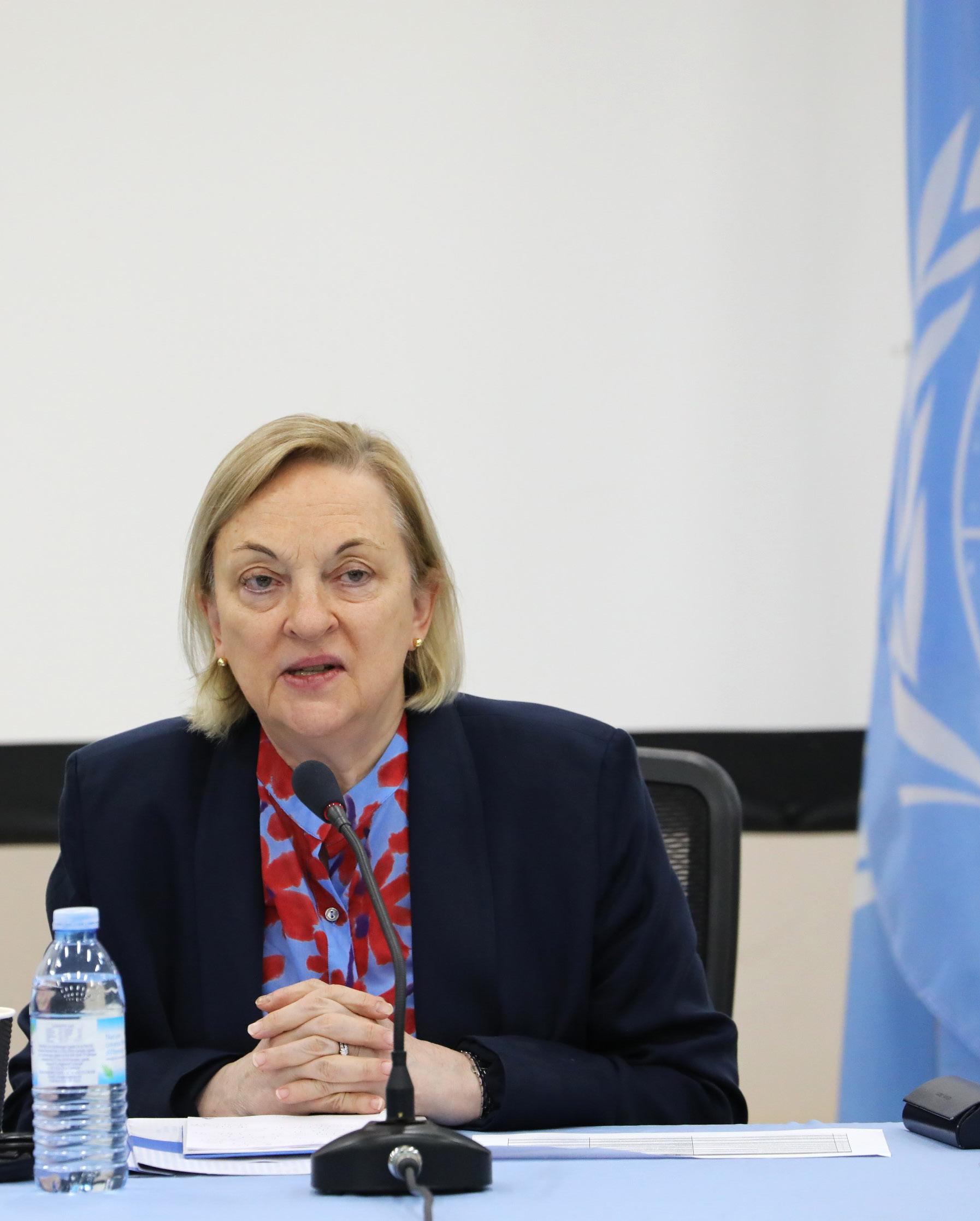
Message from the Director RSCE IN THIS
EDITION
Introducing the Technical Workshop Unit
IN THE SPOTLIGHT: Irene Zulu-Chabala
The UN Campus Joins Hands to Support Vulnerable Groups
Celebrating 76 Years of UN Peacekeeping
What is Next for UN Peacekeeping in Africa?
The Spur Winged Lapwing: Pearl of Entebbe
A Day in the Life of a Communications Officer
Why did an Introvert Join Comms?
Cry Our Beloved Trees
Staff Welfare: Nurturing a Culture of Wellbeing
Workplace Wellness: Tackling Obesity
Welcome and Farewell
QUIZ & PRIZE
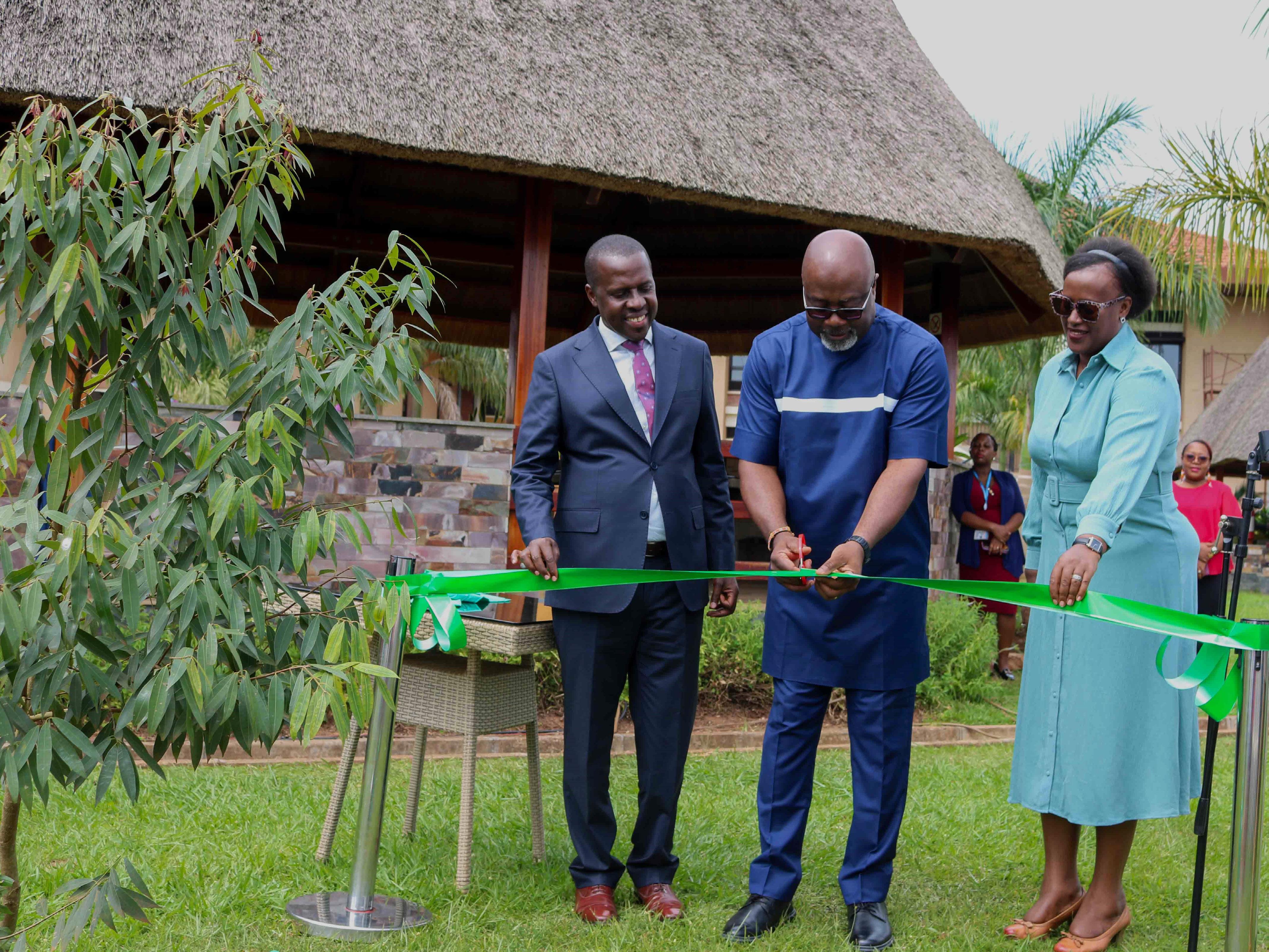
On World Environment Day 2024, RSCE joined in the annual celebrations under the theme “Land Restoration, Desertification and Drought Resilience”. The Director RSCE Mr. Paulin Djomo, flanked by Ms. Naomi Namara Karekaho, Head of Corporate Communications at the National Environment Management Authority and Mr. Emmanuel Mugisha, Town Clerk of the Entebbe Municipal Council, planted trees as a symbol of respect to mother nature.
Message from the Director RSCE
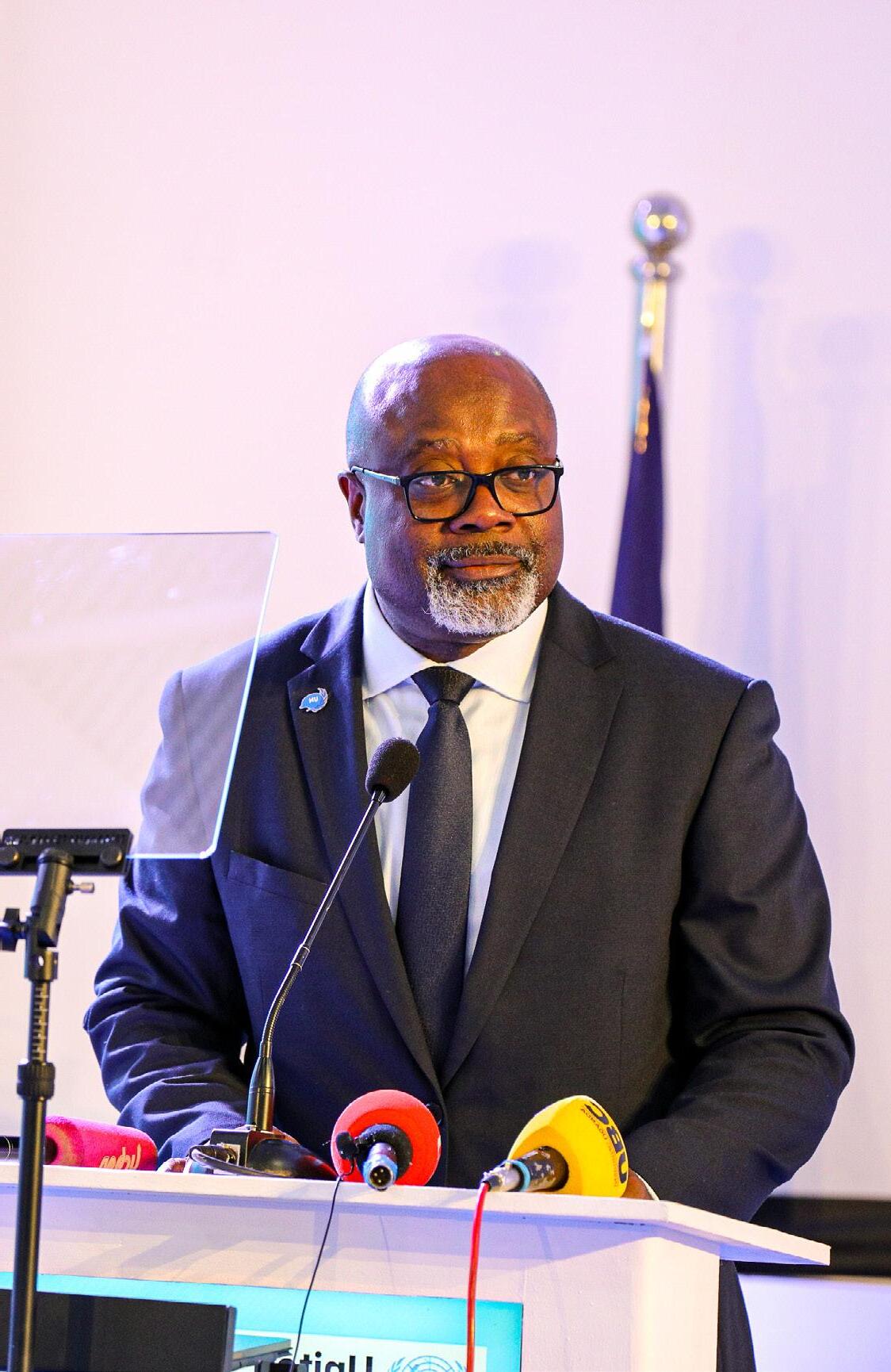
Dear Colleagues,
Welcome to the latest edition of our quarterly newsletter. In this 15th edition, I will share with you some updates and a few highlights from the second quarter of 2024.
The results of the 6th client satisfaction survey (CSAT-6) are available, and I am glad to announce that 80% of our clients are satisfied with the services we deliver across the continent. This is a 2.5% increase from the 77.5% achieved in 2022 and is the highest rating attained in the last 6 years. This is a testimony of the excellent performance you have displayed in empathetically serving our clients across Africa. Considering that we have now achieved the client satisfaction target, which was set at 80%, I have moved the target to 85% for CSAT-7. I have equally integrated the feedback received from clients into managers 2024/25 workplans to ensure that we address the gaps identified.
In April, we hosted the Security Council Military Staff Committee (MSC) for a 2-day visit aimed at better understanding RSCE’s work in supporting peace in Africa. In addition to meetings with the different sections of the centre, the MSC visited the UN C4ISR Academy for Peace Operations (UNCAP) for a briefing on the role and objectives of UNCAP in enhancing UN peacekeeping efforts through specialized technology training and partnerships. Impressed by the work of the centre, the MSC left Uganda satisfied that the support provided by the centre to Peace Keeping Operations is aligned with the Security Council mandate. I am sure the committee will become a strong ambassador of the centre at the Council.
World Malaria Day was celebrated on 25 April, a day during which we reminded all staff that malaria remains a threat to public health. Though it is both preventable and curable, mortality from the disease is still overwhelming with over 10,000 deaths due to malaria per year in Uganda alone. Our message is clear, “no mosquito bite, no malaria”. Protect yourselves and your family. See the link to the video: WORLD MALARIA DAY
This year during the Women’s Day celebrations, energized by the young women we invited on campus, determined to further their education through data literacy, I promised to donate computers to each of the schools that attended. At a ceremony organized on campus on 30 April, we handed over 90 laptops to 9 schools, and 10 laptops and 1 printer to the Ugandan Police supporting UN airport operations. This donation to schools is aimed at enhancing learners’ potential by equipping them with tools and technology that expands their horizons for the future. The impact of this donation was summarized by a headteacher who told us that he now had enough computers to upskill lower-level students who had been left behind due to a lack of equipment.
In May, I traveled to the African Union (AU) Headquarters in Addis Ababa with the Chief Strategic Planning Unit and colleagues from HRSD in DOS. Invited by the AU, we held several meetings with AU colleagues to better understand the AU operations in the areas of Human Resources, travel, finance, and logistics. The aim of the visit was to strengthen the current AU-UN cooperation framework and identify areas of collaboration. There is room for improved collaboration, and we are working on advancing that agenda.
On 5 June, we celebrated World Environment Day under the theme Land Restoration, Desertification and Drought Resilience We were joined on campus by the Entebbe Town Clerk and the Head of Corporate Communication from the National Environmental Management Authority. Both addressed the staff on environmental issues, viewed from a government lens. They praised the efforts of the centre in maintaining a green campus aligned with environmental goals. On the same day, we inaugurated the first phase of a rainwater harvesting project that will reduce water bills while providing ample water for irrigation, engineering, and sanitation needs, and planted 14 more trees on campus. This is in further confirmation of our commitment to safeguarding the environment in which we live and work.
The past few months have been challenging for the peace keeping world and particularly for UN operations in Africa. The closure of peace keeping operations in Mali and Sudan (MINUSMA & UNITAMS), and the gradual reduction of the footprint in the DRC (MONUSCO) have a direct consequence on our operations. Effective 1 July 2024, the staffing of the center will reduce accordingly. We are making efforts using resources available to keep the skills and staff despite the reduction in footprint.
The ASG for Support Operations DOS, Ms. Lisa Buttenheim, was in Entebbe on a 3-day visit and met with various managers at the RSCE who spoke with her at length about the work we do and updated her on several issues including the status of mission downsizing and liquidations of MINUSMA, UNITAMS and MONUSCO’s drawdown. She made a tour of the Service Lines and campus and was very appreciative of the work you all do, expressing her gratitude during the staff townhall.
Finally, I thank all who have contributed to previous editions of the RSCE Newsletter and the communications team for their efforts to make it happen. If you have an interesting story, contact the RSCE Communications Team at rsce-communications@un.org.
Paulin Djomo, Director RSCE
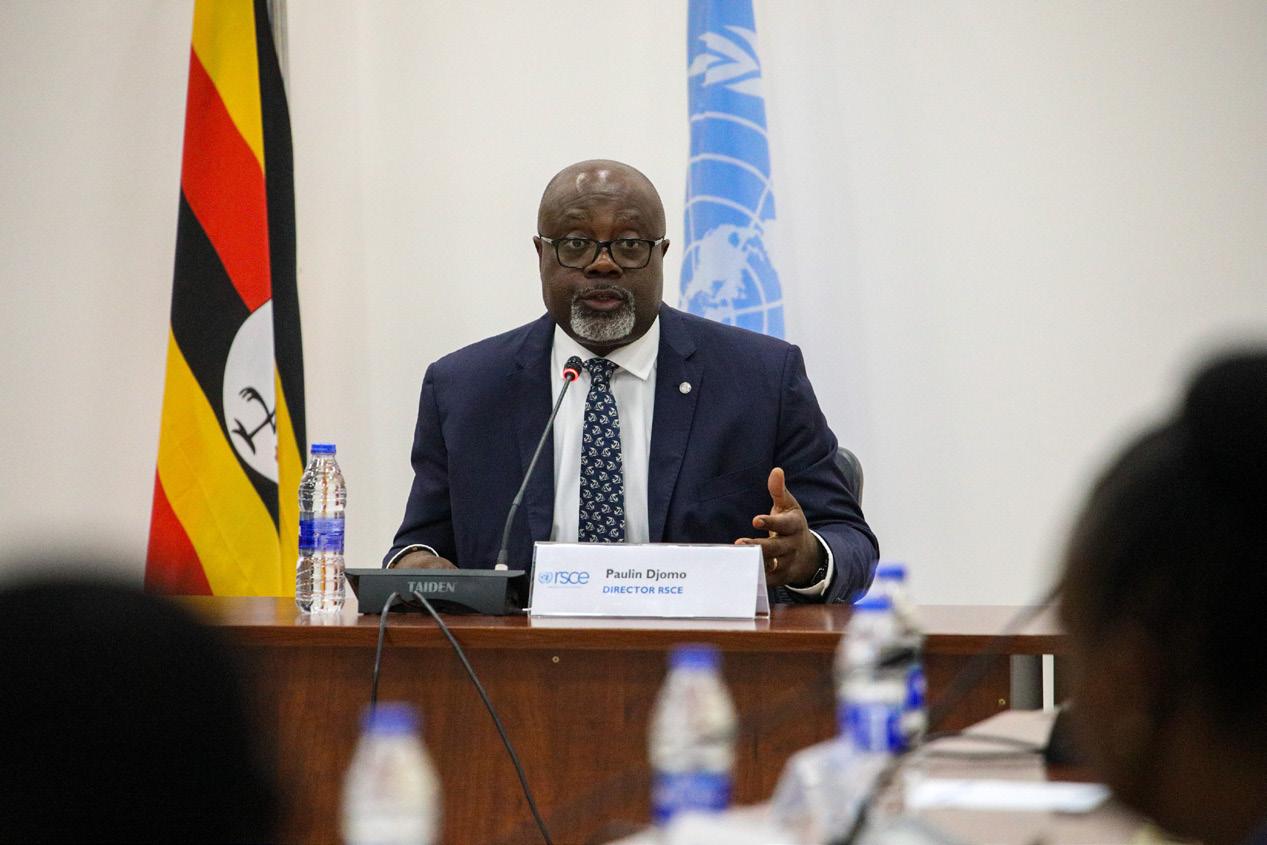
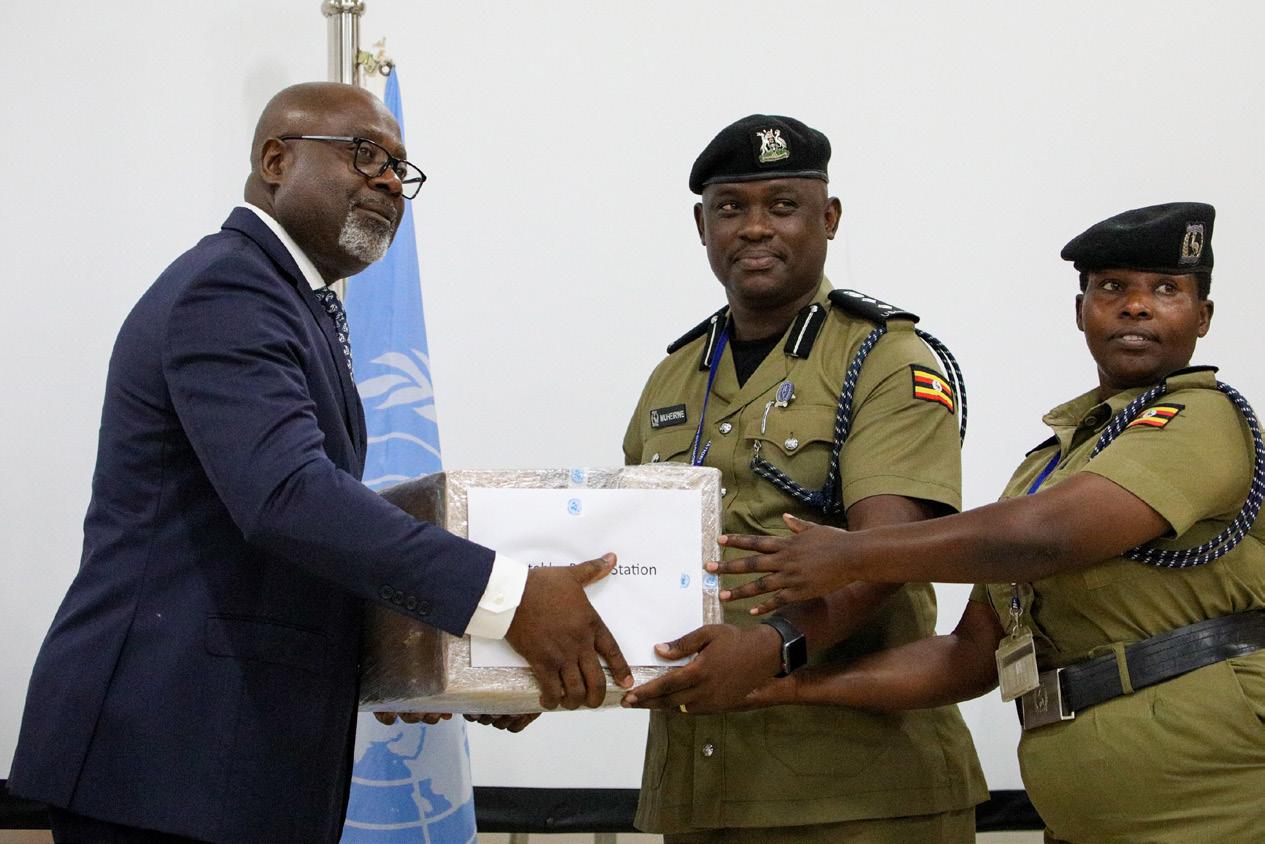
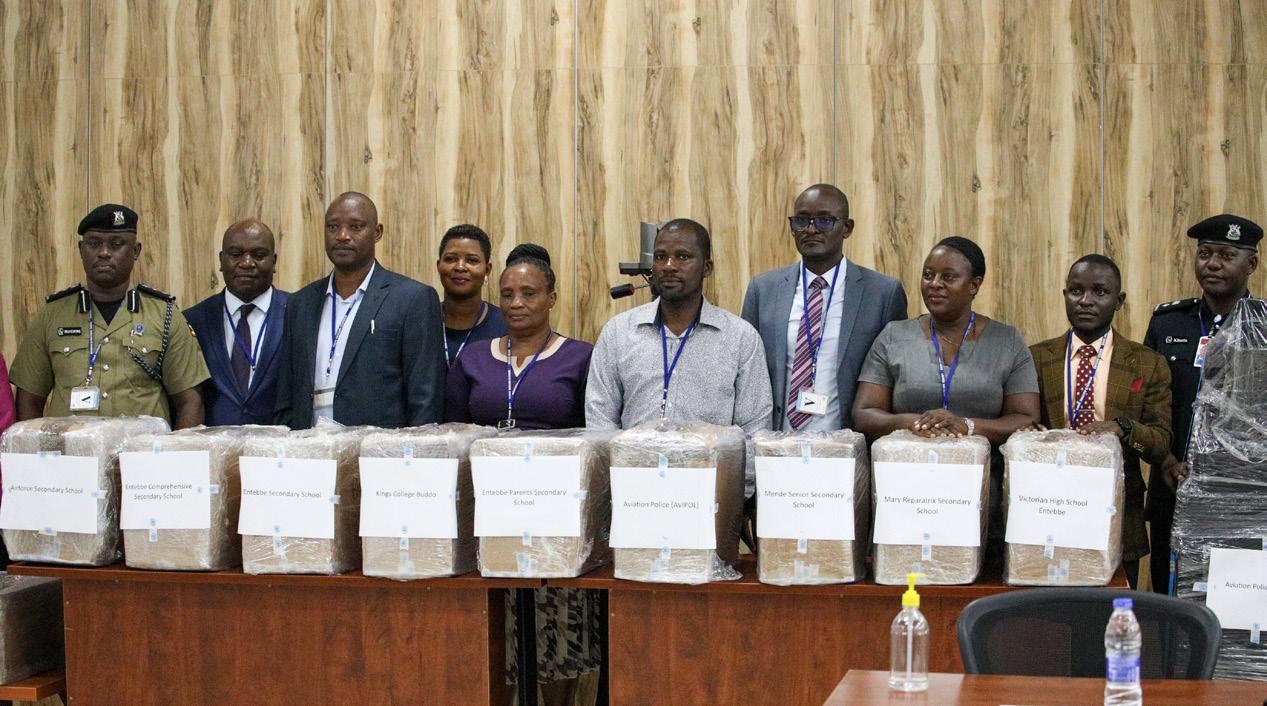
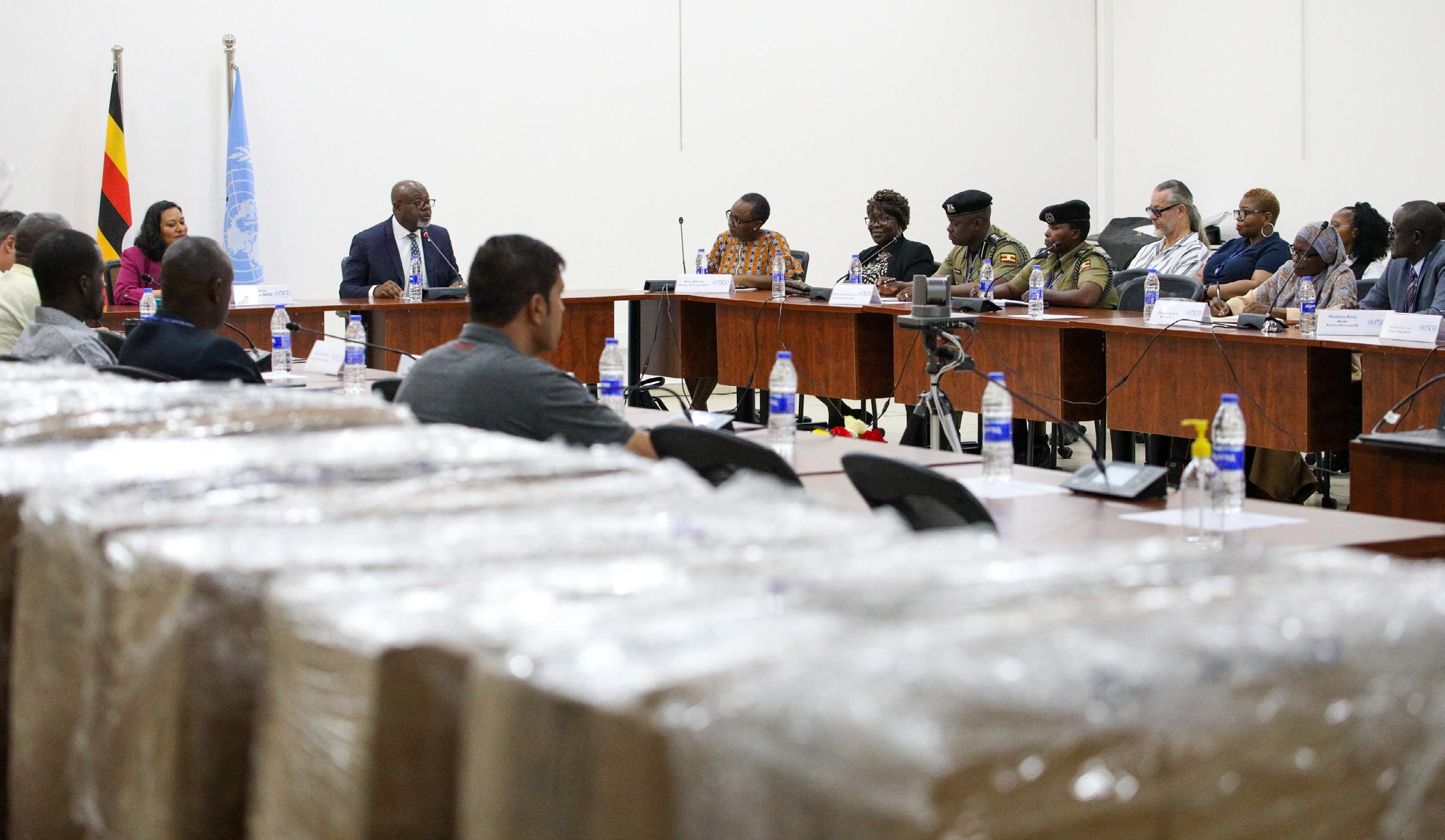
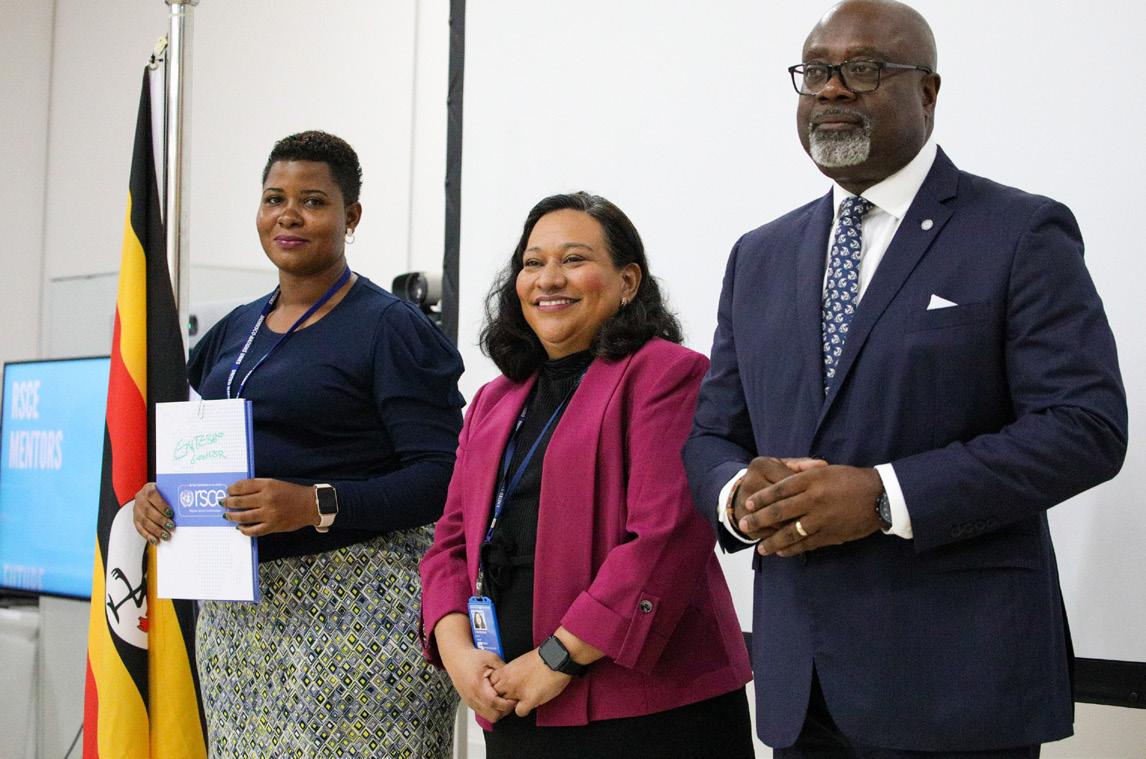
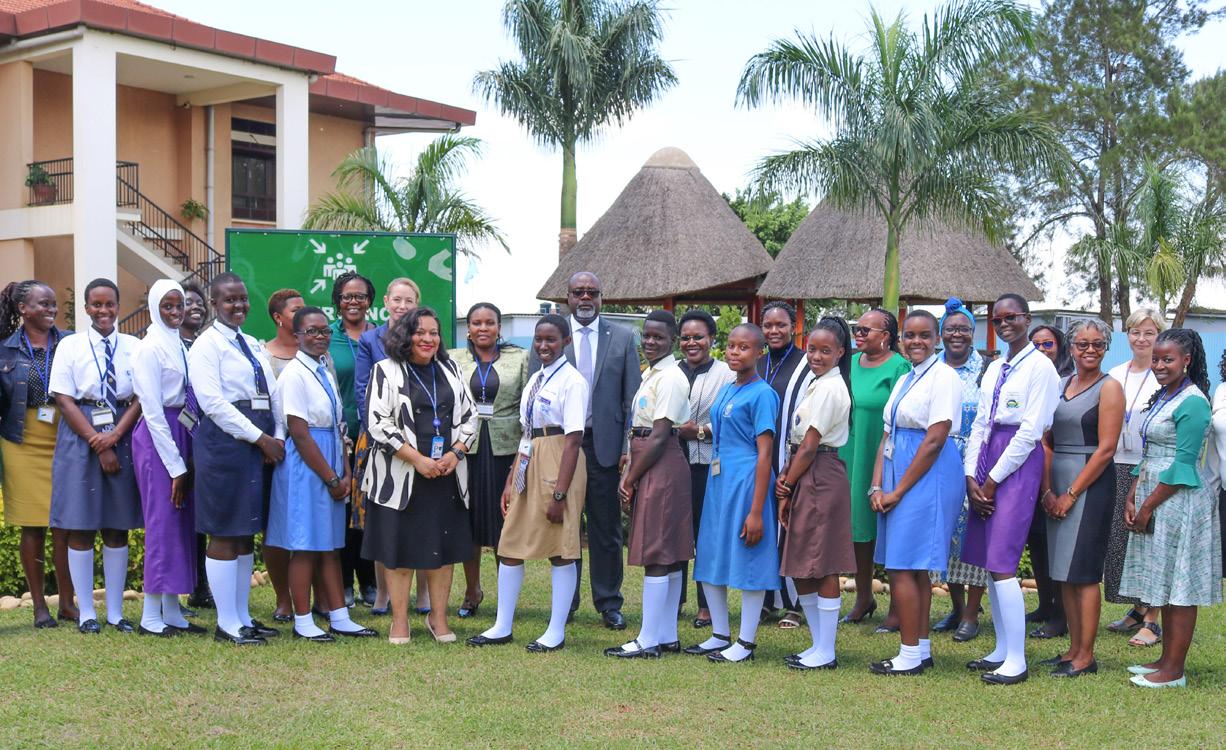
The RSCE made a significant contribution to the future of education and safety in Uganda by donating 100 computers and printers to schools and law enforcement agencies. “Our children, our future leaders, deserve to be empowered. Technology is their ally, enhancing their literacy, collaboration, and digital skills. By providing computers to law enforcement, we enhance safety for all.” said Ms. Nalini Contreras, Deputy Director of the RSCE.
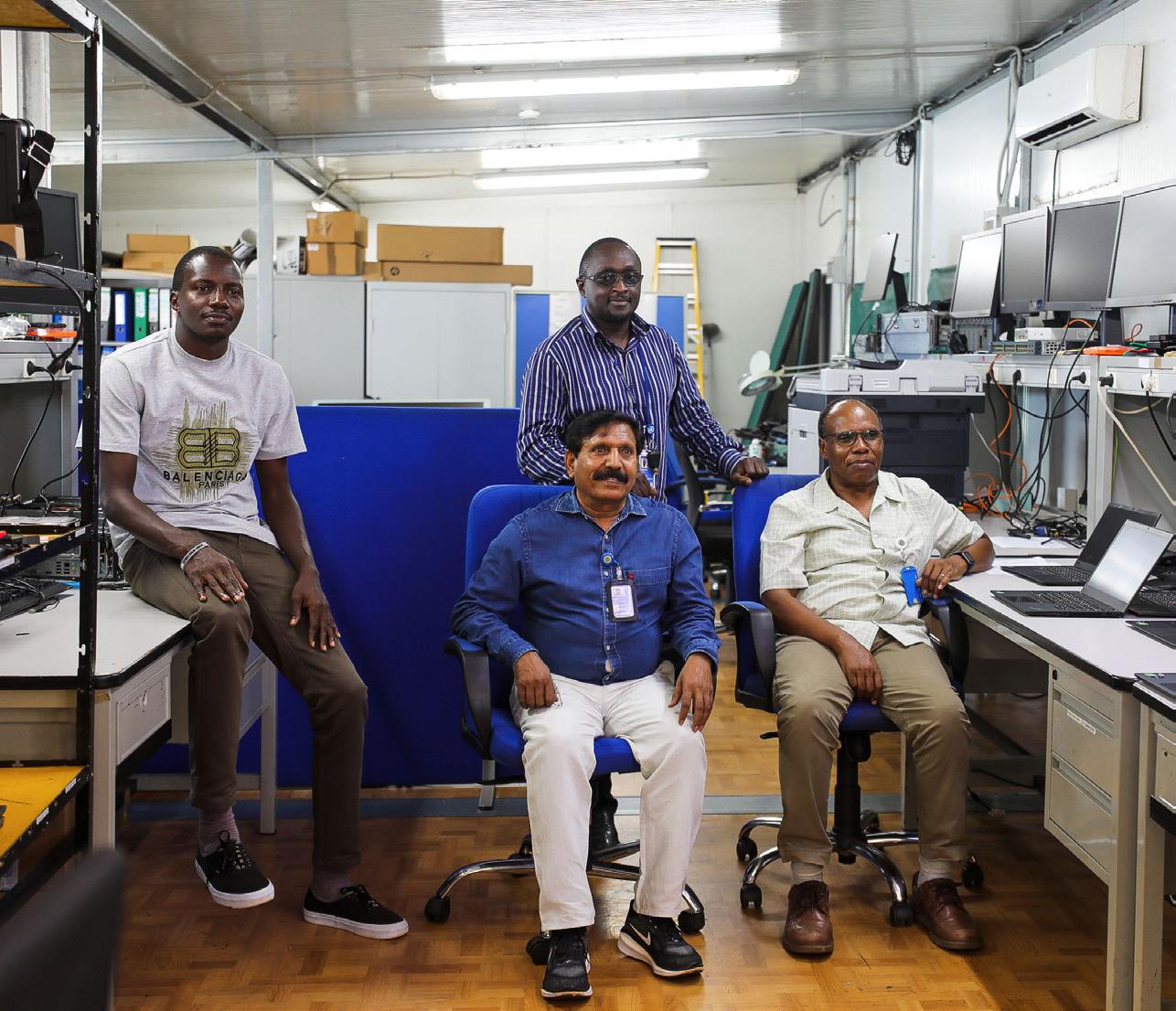
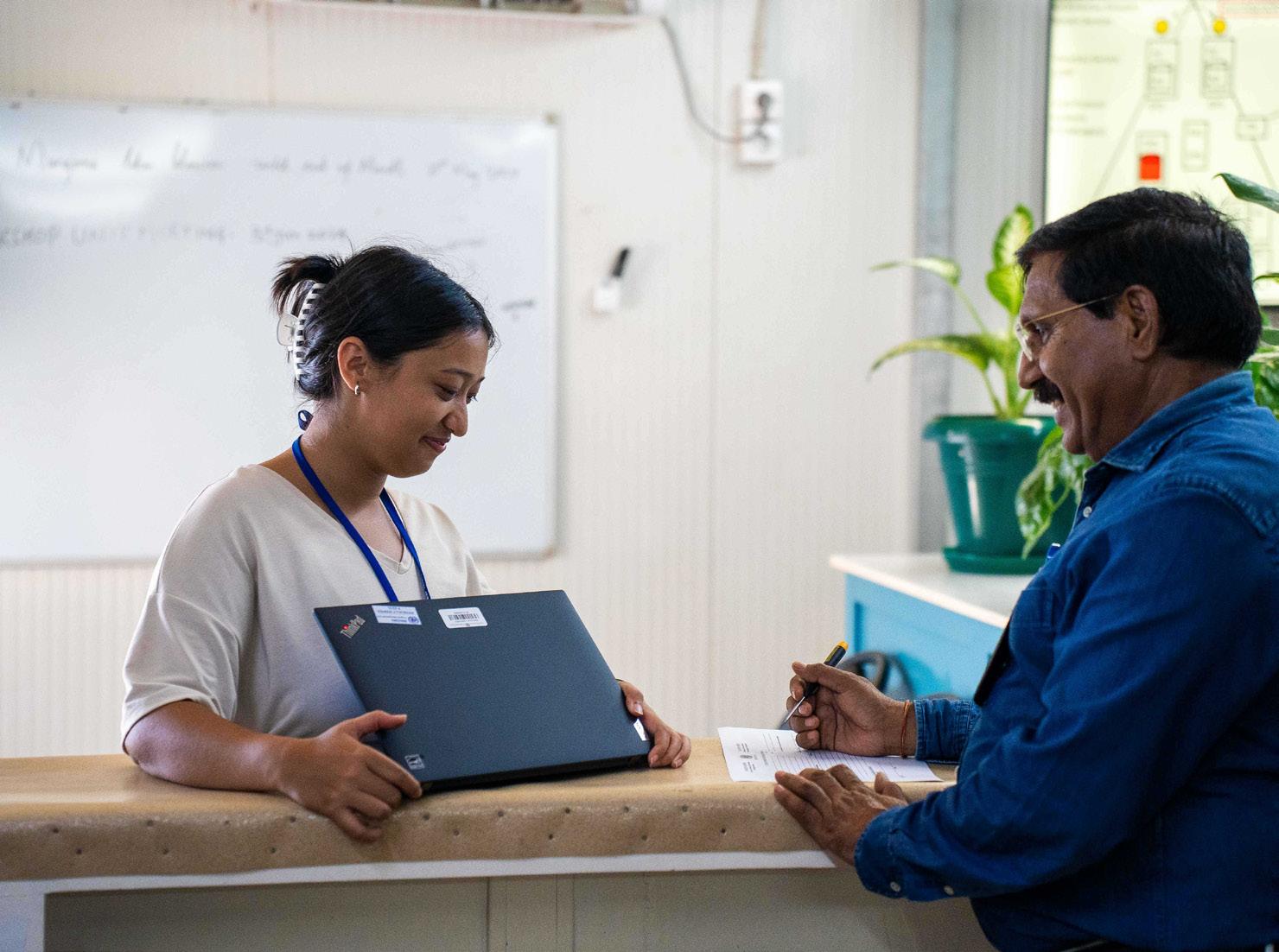
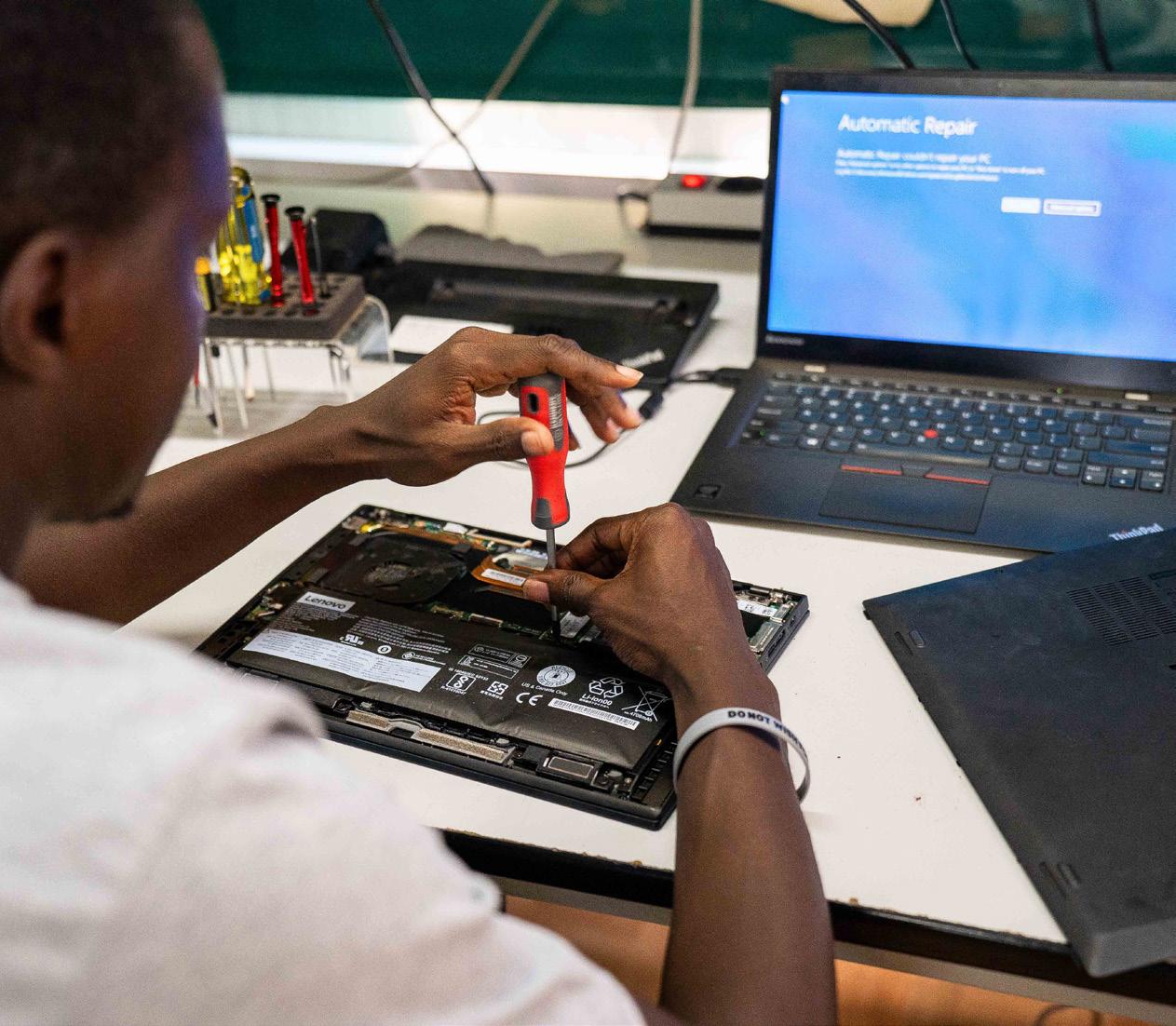
Introducing the Technical Workshop Unit: Enhancing Digital Solutions
By
In the dynamic landscape of modern technology, ensuring seamless operation and support is paramount. Within the Regional Field Technology Service Operations Section (RFTS), the Technical Workshop Unit stands as a beacon of reliability, innovation, and education.
The Technical Workshop Unit’s primary mandate is to provide comprehensive technical support to users, addressing both software and hardware concerns. Their mission extends beyond mere troubleshooting; it encompasses the vital task of educating users on various facets of information technology integral to their workspaces. Comprising a team of dedicated individuals, the unit boasts a diverse skill set, including expertise in telecommunications, IT, and user support.
Operations
The Workshop offers extensive support services from printer setup to configuration of all types of computer devices for the RSCE, as well as those from MONUSCO and other UN missions.
The team is responsible for the maintenance and coordination of warranty repairs for Lenovo and HP equipment with authorized service centers. In terms of computer hardware related issues, this involves creation of computer images, installing various software that has been earmarked for UN use, installation and maintenance of all copiers, plotters, printers, and Infokiosk terminals.
The Workshop also supports the Property Management Unit, carrying out the testing of any equipment returned by users, and verifying serviceability, as well as providing any required support in the write-off process. In addition, the team carries out technical inspection of new Purchase Orders, ensuring that the supplied equipment/accessories meet the quantity and specifications set by the requester. The unit also provides reproduction services that involve printing maps for military briefings, banners etc.
Service Excellence
A robust ticketing system, coupled with meticulous time management, ensures timely delivery of services. Despite facing constraints such as equipment shortages and high user volumes, the team remains undeterred, leveraging their resilience and resourcefulness to overcome obstacles.
Memorable Moments
Several recent achievements are worth celebrating, for example, the Workshop played a pivotal role in the meticulous preparation of more than 100 laptops recently donated to local schools in Entebbe, underscoring their commitment to community welfare.
Moreover, a standout accomplishment was the seamless transition from Windows 10 to Windows 11 across 600 user laptops, executed with remarkable efficiency and minimal disruption.
Message to Clients
To their valued clients, the team extends a simple yet powerful message: they are always here to serve and support. As technology continues to evolve, their role remains indispensable in ensuring seamless digital solutions for all.
1. Be Cautious with Beverages
Avoid carrying any drinks inside your computer bag along with your laptop.
2. Keep Food and Drinks Away
When you’re working, keep all food, drinks, and other liquids at a safe distance from your laptop.
3. What to Do If a Spill Occurs
• Immediate Action: If you spill liquids on your laptop keyboard, do not attempt to switch it on. Turning it on can create a short circuit on the motherboard.
• Power Down: If your laptop was already on when the spill happened, switch it off immediately.
• Seek Professional Help: Bring your laptop to our workshop as soon as possible. We will open it, dry it thoroughly, and restore it to working condition.
IN THE SPOTLIGHT – IRENE ZULU-CHABALA:
Serving the People that Serve Humanity
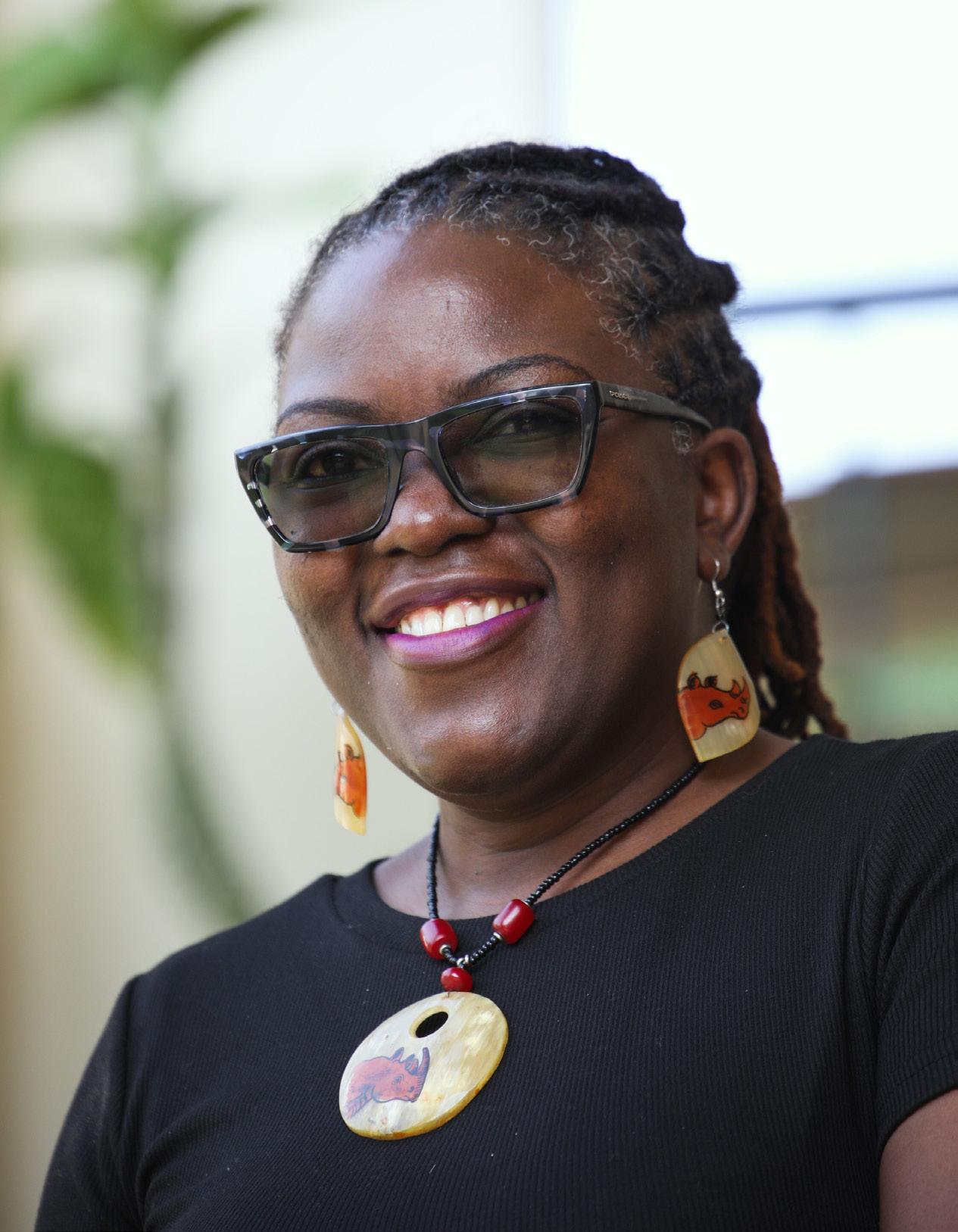
In the bustling world of telecommunications at the RSCE, there’s a figure whose presence resonates with warmth, kindness, and diligence. Irene Zulu-Chabala finds fulfillment in her role as Telecommunications Assistant, aiding in telephone billing matters, supporting her team, and resolving urgent issues. Having dedicated her career to the United Nations, her journey epitomizes the values of our organization –enriching lives and inspiring others to embrace the power of compassion and commitment.
A Lifelong Journey with the UN
Irene’s professional odyssey has been intertwined with the United Nations for over three decades. Her journey to Uganda, though initially unexpected, has been a serendipitous adventure. Through a mobility exercise, she found herself in the Pearl of Africa, embracing it with open arms.
Based at the RSCE since 2018, Irene’s enthusiasm for her work finds its pinnacle in the Regional Field Technology Services (RFTS) section, a cornerstone service line at RSCE: “Without a doubt we are one of the most critical service providers of the organization. We provide the tools that everyone needs to perform their work i.e., internet, computers, radios, etc.”
Regional Field Technology Services: A Nexus of Support
The clients of RFTS encompass eleven field missions and the RSCE itself. Irene’s typical day revolves around the intricacies of telecommunications at the RFTS, where her role as Supervisor of the Regional Telephone Billing Unit (RTBU) entails corresponding with clients and colleagues, offering assistance, and ensuring clarity in telephone billing matters. Her job extends to providing support to her team, updating senior managers on billing affairs, and overseeing RTBU’s operations.
Ensuring Timely Service Delivery
By Katja Kuivanen, Communications Officer, RSCE
organizing, client orientation, and good communication skills are also essential. You should at least have some technological awareness or be inclined to learn.”
A Message of Support and Empathy to the Field
Irene extends a message of unwavering support to field missions. Acknowledging the trials and tribulations they face, she reassures them of RTBU’s commitment: “We are here to serve. We understand the hardships or struggles that they may be going through. Mission life is not always rosy, so we know that we have to provide efficient and effective services.”
Life Beyond Work: A Pursuit of Balance
“Be humble, always. Work with integrity, and don’t compromise your self-worth for temporary gains. Treat people with kindness and always respect others, and yourself.”
Embracing a holistic approach to life, Irene indulges in various activities that nourish her soul and enrich her spirit: “Work-life balance is very important to me, and I try not to compromise on it. In my free time I like to socialize with friends. I love music and dancing, going to the cinema, reading books, watching various shows on TV, playing golf whenever I can, and sometimes cooking. The one thing I love the most is to spend time with my family. I also have three precious dogs - two in Uganda and one back home. I love them.”
The Fulfillment of Service
When asked how she ensures that her clients get what they need, when they need it, Irene asserts: “The RTBU has Service Level Agreements with client missions, and Key Performance Indicators for the processes that we perform, requiring 100% achievement of timelines. We also work with other offices that require us to provide them information or data on time. So, my job is to make sure that every member of the team processes their recovery reports as per our timelines.”
Essential Skills for Success
When asked what essential skills are needed to excel in her role, Irene emphasizes: “You must have some computer literacy, leadership, and supervisory skills to lead a diverse team. Planning,
For Irene, the most fulfilling aspect of her work lies in serving those who serve the world. Being part of an organization dedicated to global betterment imbues her with a profound sense of purpose and fulfillment. “I think that when you get to know and understand what we do as UN staff, and commit yourself to the cause, the job becomes very fulfilling.”
Words of Wisdom: Humility and Self-Love
Irene urges her colleagues to remain humble, uphold integrity, and cherish their well-being. To women especially, she advocates for solidarity, mentorship, and self-care as pillars of empowerment.
The UN Campus Joins Hands to Support Vulnerable Groups
By Pontso Gloria Tsoeunyane, Welfare Officer, RSCE
The Welfare Committee recently organized a donation and charity event aimed at supporting marginalized and vulnerable groups in the local Entebbe community. Spearheaded by the Welfare Officer, the initiative garnered widespread support from UN personnel and staff.
The event, which ran from October 26th to November 30th, 2023, aimed to foster partnerships with the local community while promoting UN Entebbe Campus’ visibility. It sought to spread compassion and bring joy and impact to those in need, regardless of age, ethnicity, disability, or gender.
Generous contributions poured in from various sources, including UN personnel, Service Lines, offices, and fellowships, totaling an impressive 6,561,000 UGX. These contributions included a diverse array of items such as assistive tools, clothing, stationery, toys, money, and groceries.
The donations were distributed in two significant lots, each targeting a different set of beneficiaries. The first lot focused on supporting road cleaners, acknowledging their vital yet often overlooked role in urban sustainability. Groceries and essential items worth 3,401,000 UGX were distributed to 55 road cleaners, aiming to address their vulnerable working conditions and promote public health and safety.
The second lot was dedicated to Sure Prospects School, which provides inclusive education for disabled and underprivileged students. Essential items, furniture, and assistive devices totaling 3,160,000 UGX were provided to support the school’s mission of ensuring equitable access to education for all students.
The success of the donation drive was a testament to the generosity and compassion of the UN Entebbe community. Moving forward, there is a call for ongoing support to ensure the sustainability of such initiatives and address persistent challenges faced by marginalized groups.
The initiative received widespread acknowledgment and appreciation. We would like to extend our heartfelt gratitude to the RSCE Director and senior management, Christian fellowship, HRTMU, OIOS, TSL, OSSL, RFTS, CSL, CPT, and dedicated Welfare Committee members. A special to Ms. Theresa Aciro who has voluntarily dedicated her time and skills. Your commitment and dedication are deeply appreciated and have made a meaningful difference in the lives of the vulnerable and poorest of the poor.
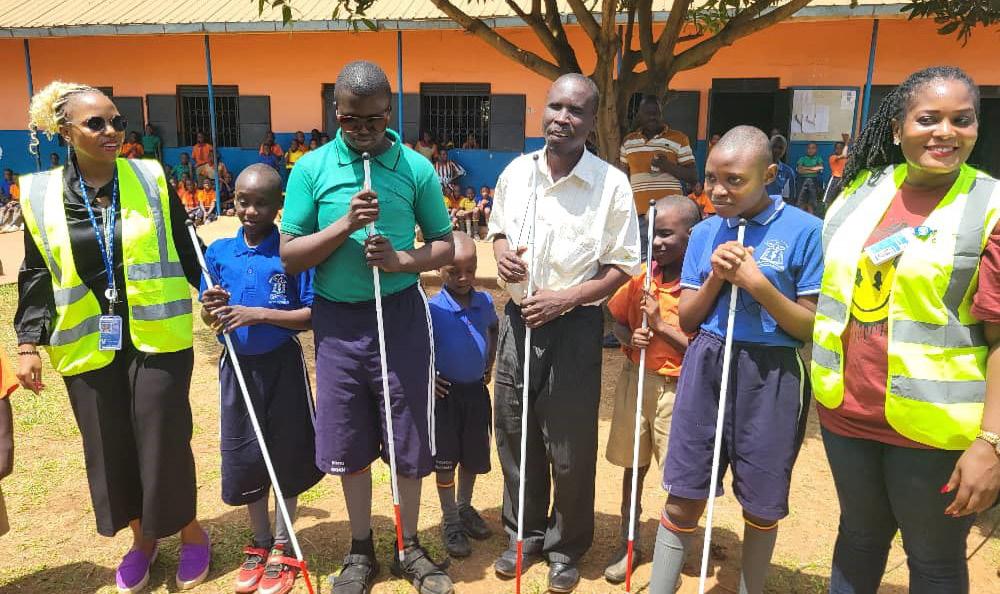
-
“You have encouraged us so much, braille papers are so expensive, you bought them! Many of us with disability come from low earning families. We
appreciate the TV screen, as children with hearing impairment can at least learn through visuals and other children will be entertained through this screen. It has been difficult to get all these items to implement inclusive education as we want to, so thank you so much!”
- Florence Nayiga, Director and Co-Founder of Sure Prospects School.

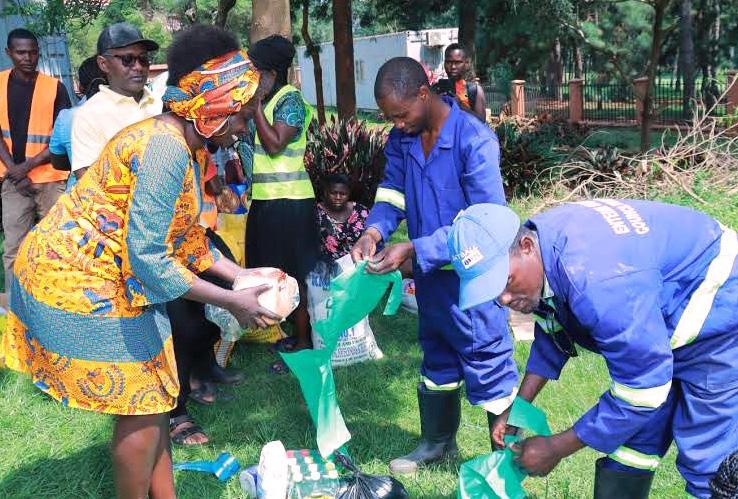
By Katja Kuivanen, Communications Officer, RSCE
Celebrating 76 Years of UN Peacekeeping

On May 29, the world comes together to honor the brave men and women who serve as United Nations peacekeepers. The International Day of UN Peacekeepers is a tribute to the dedication, professionalism, and courage of those who work tirelessly to bring peace to some of the world’s most volatile regions.
A Legacy of Peacekeeping
For 76 years, United Nations Peacekeepers have worked to save and change lives in the world’s most fragile political and security situations. Since 1948, more than two million uniformed and civilian personnel have helped countries to transition from war to peace. Today, more than 70,000 peacekeepers serve in 11 missions deployed in hotspots around the world. They come from diverse backgrounds, representing various countries and cultures, united by a common goal: to promote peace and stability.
“Fit for the future, building better together”
Observed under the theme “Fit for the future, building better together,” this year’s International Day looked at the invaluable contributions military, police and civilian peacekeepers have made over the last seven decades. It encapsulated the spirit of progress and collective action towards creating a more equal, just and sustainable world. Watch this video to learn more.
How the RSCE is Contributing
The RSCE is the largest Service Centre in the UN Secretariat serving over 16,000 personnel in UN peacekeeping missions and small political offices in Africa. The RSCE is proud to play a role in supporting peace in Africa by providing administrative, logistical and IT support functions to peacekeeping missions, relieving their pressure to allow them focus on their important mandate.
The RSCE also facilitates trainings at the Regional Training and Conference Centre for the missions, ensuring they keep abreast with the latest technologies and trends through UN C4ISR Academy for Peace Operations (UNCAP), Peacekeeping Intelligence Academy and the recent Virtual Instructor Led Training facility. We are proud to serve those that lay everything on the line to ensure that all peoples are safe and secure.
Looking Ahead
Over the years, peacekeeping has evolved to adapt to the changing political landscape and nature of conflicts which have become more complex and interconnected. With support from UN member countries, it continues to advance the path set forth in the UN Secretary-General’s New Agenda for Peace which calls for a more robust, holistic and collective response to the security threats of today and tomorrow.
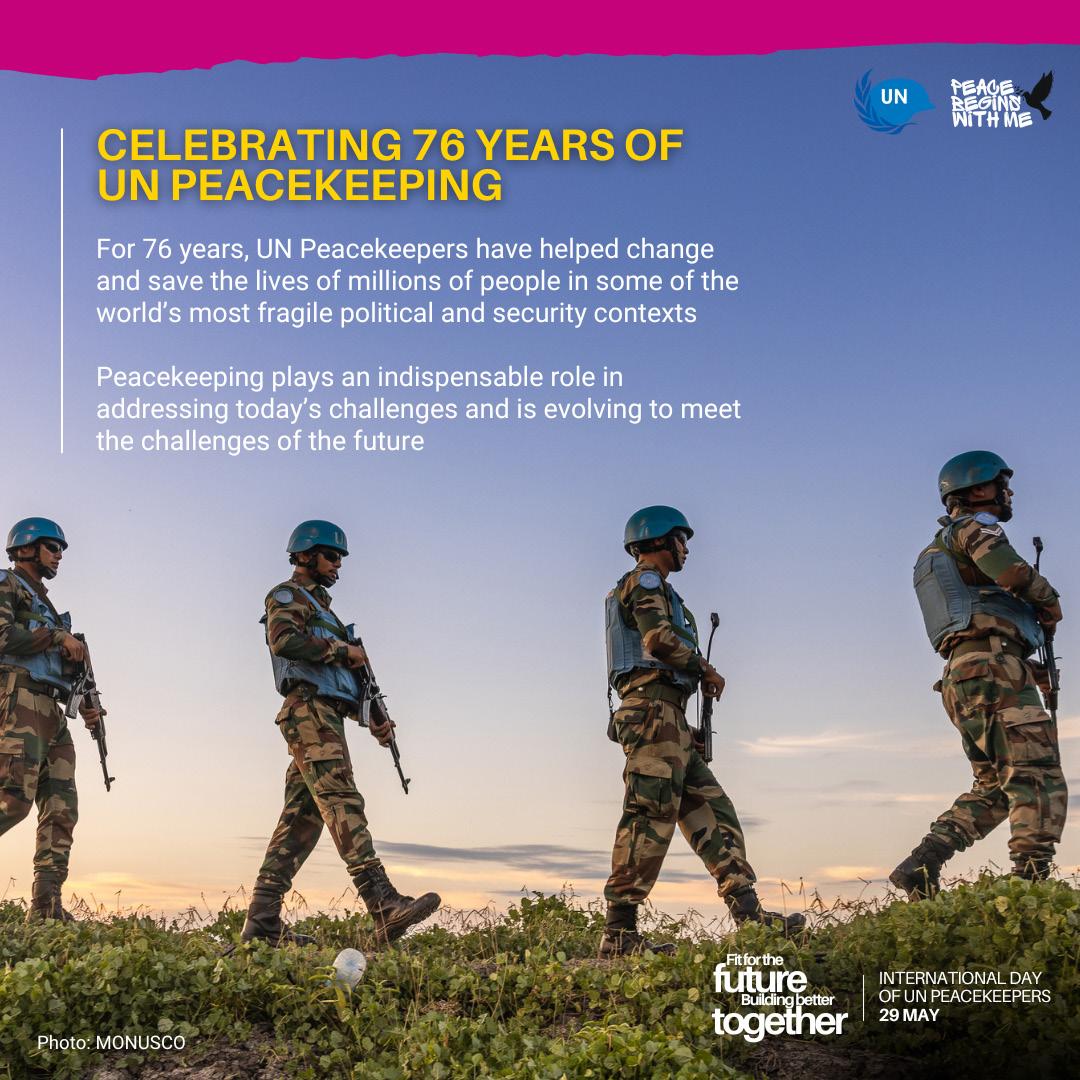
By Dejan Stepanovic, Chief of Communications, RSCE
What is Next for UN Peacekeeping in Africa?
The landscape of United Nations Peacekeeping in Africa is undergoing significant changes, and it might be moving towards a future where regional peace support operations like the African Union (AU) and Regional Economic Communities (RECs) will become a central player in maintaining stability across the continent. These changes go hand-in-hand with evolving geopolitical dynamics that will in the short term create challenges, but in the long term, opportunities to enhance and strengthen the legitimacy of peacekeeping efforts.
The recent closure of the long-standing Multidimensional Integrated Stabilization Mission (MINUSMA) in Mali, and the ongoing drawdown of the UN Stabilization Mission (MONUSCO) in the Democratic Republic of Congo (DRC) marks a turning point in the future trajectory of UN peace operations in Africa.
These factors highlight the complexities of an increasingly polarized world and exert urgency on the UN to reassess how it operates in fragile and highly political contexts. The closures of these large UN operations come in line with previous positive cooperation with African-led initiatives, a trend that has been gaining momentum over the past decade.
As the UN missions draw down, African-led Peace Support Operations (PSOs) under the AU and RECs are simultaneously preparing to assume more and more responsibilities to attempt to ensure long overdue peace and security. These PSOs, such as the AU-led missions in Somalia and coalitions like the Multinational Joint Task Force in the Lake Chad region, represent a diverse range of responses to complex security challenges across the continent.
One significant advantage of African PSOs lies in their ability to deploy in a wider variety of contexts beyond traditional peace and security operations. PSOs have already been actively involved in addressing humanitarian crises, supporting electoral processes, and tackling transnational threats like terrorism and organized crime. This is all accumulated capital, also showcasing the ability for a multifaceted approach to regional stability.
There will be challenges with this transition. The United Nations is an 80-year-old organization. It took decades for the UN to build its reputation, systems, and human capital to manage complex issues in every corner of the world.
While African PSOs have demonstrated operational capabilities, they often lack the multidimensional approach of UN missions that integrate civilian staff for critical tasks such as peacebuilding, humanitarian, human rights law, and conflict resolution.
Moreover, financial sustainability remains a key concern as African-led PSOs heavily rely on external funding, primarily from the United Nations and foreign donors. While recent UN Security Council resolutions aim to strengthen partnerships and funding mechanisms, addressing this dependency and enhancing regional ownership is crucial for the long-term success of peacekeeping initiatives in Africa.
Looking ahead, the future of UN peacekeeping in Africa depends on strategic reforms and partnerships that enhance the capabilities and legitimacy of regional peace support operations. Collaborative efforts between the UN, AU, RECs, and member states are essential to define clear mandates, improve coordination, and foster a shared vision for peace and stability across the continent.
Investing in capacity building, training, and technology transfer to regional actors will bolster their ability to address emerging security threats effectively. Strengthening regional conflictresolution mechanisms, mediation capacities, and inclusive dialogue platforms within African institutions will also contribute to sustainable peacebuilding efforts.
A comprehensive approach is needed to address operational challenges, enhance financial sustainability, and strengthen diplomatic and mediation capacities.
By harnessing regional strengths and partnerships, the UN and African stakeholders can pave the way for a more secure and peaceful Africa in the years to come. One of the crucial prerequisites that remains is a need for strategic rethinking of the existing and future UN peace operations.
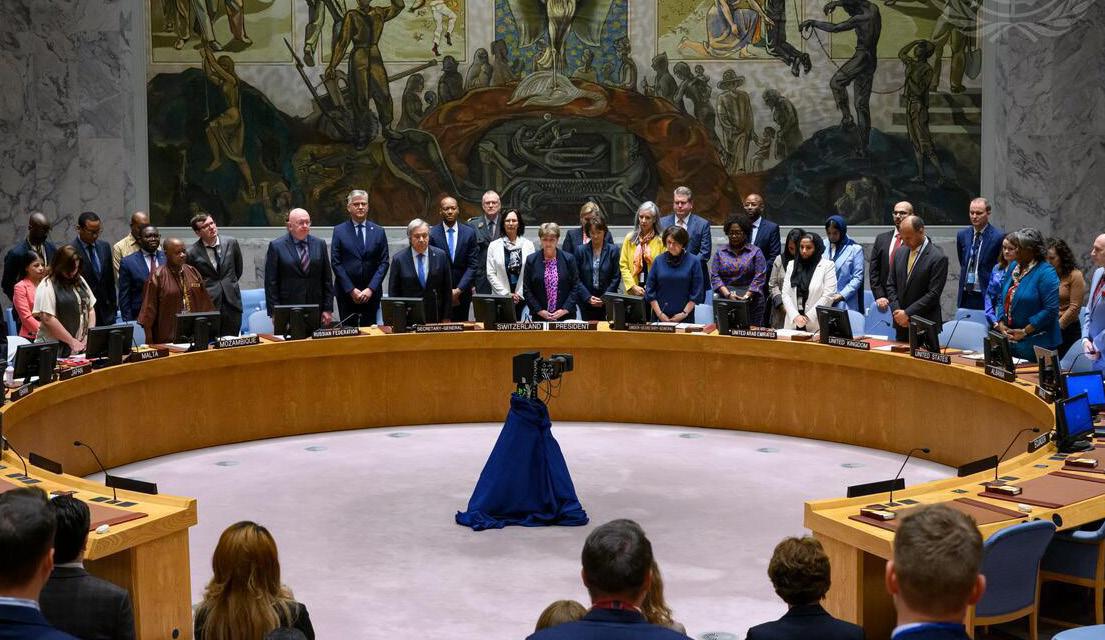
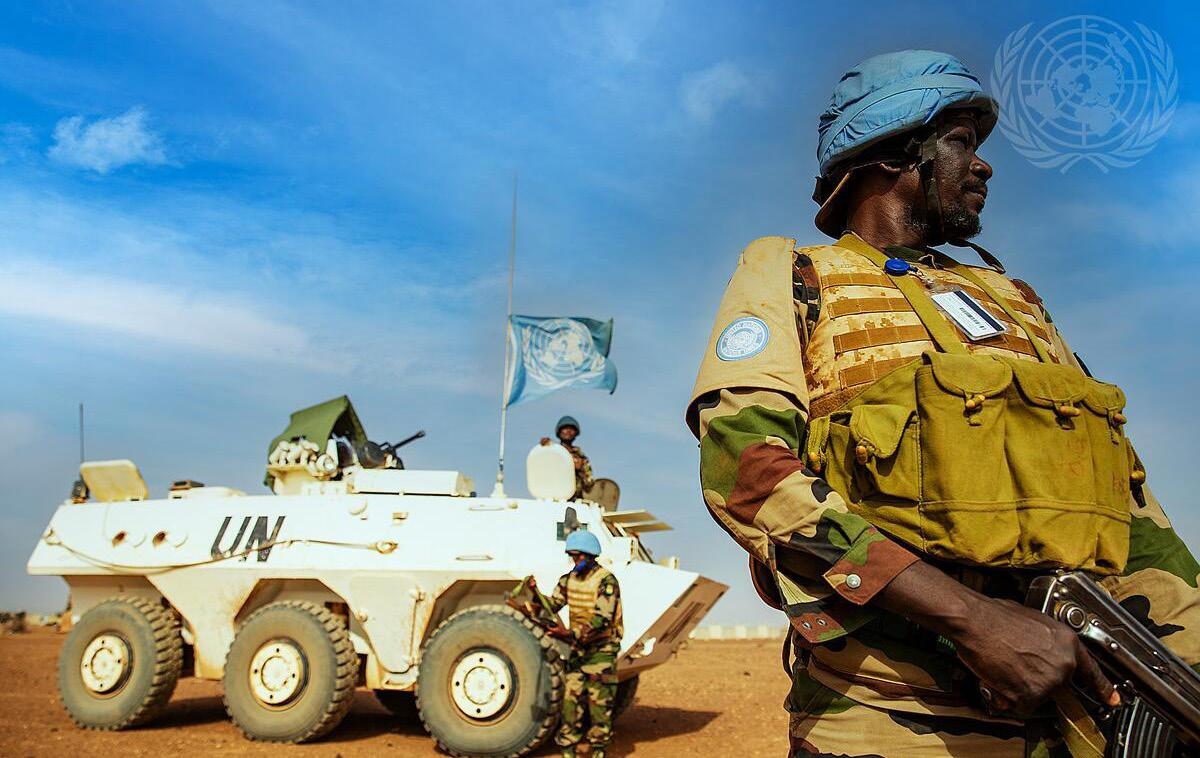

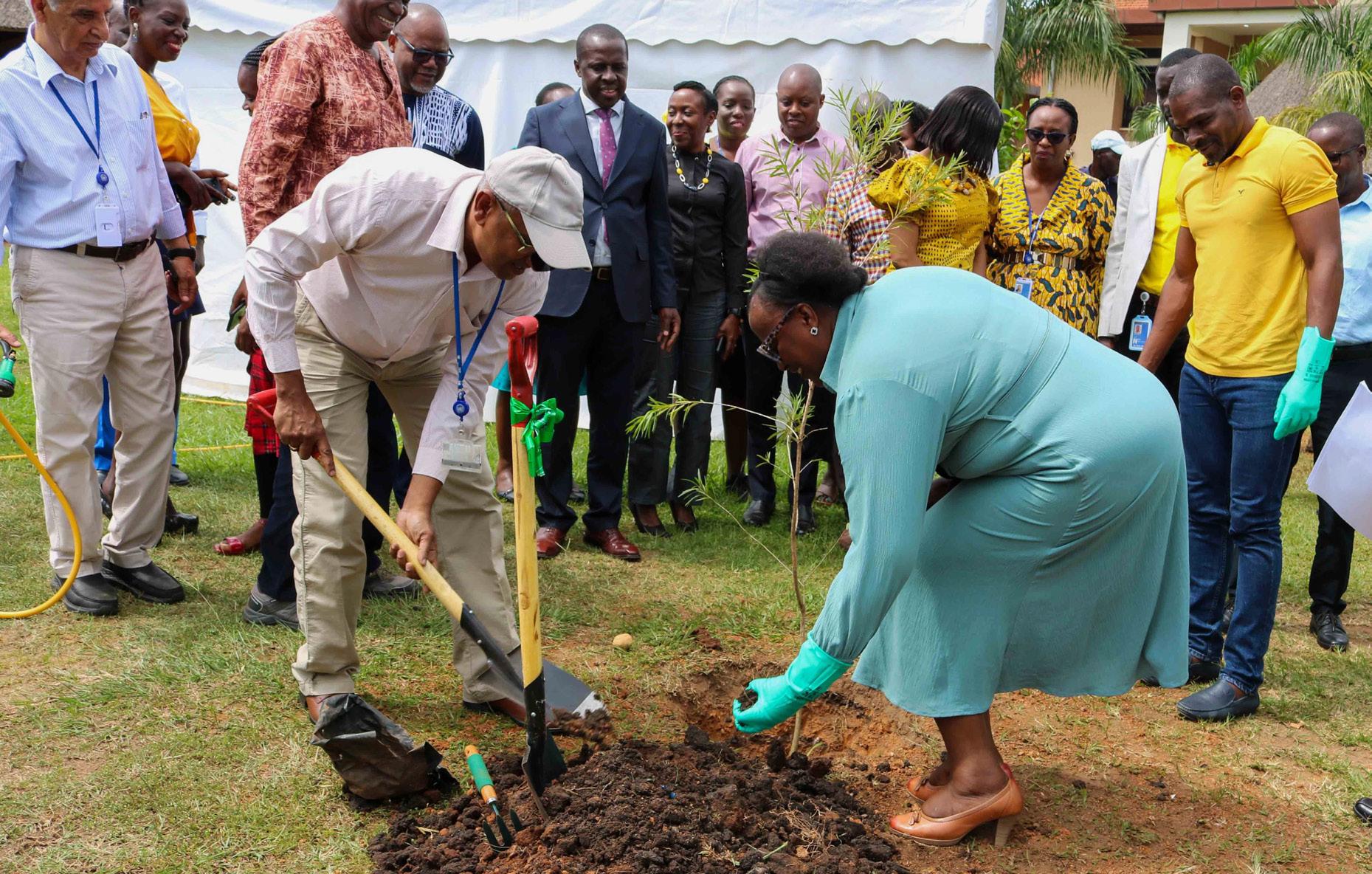
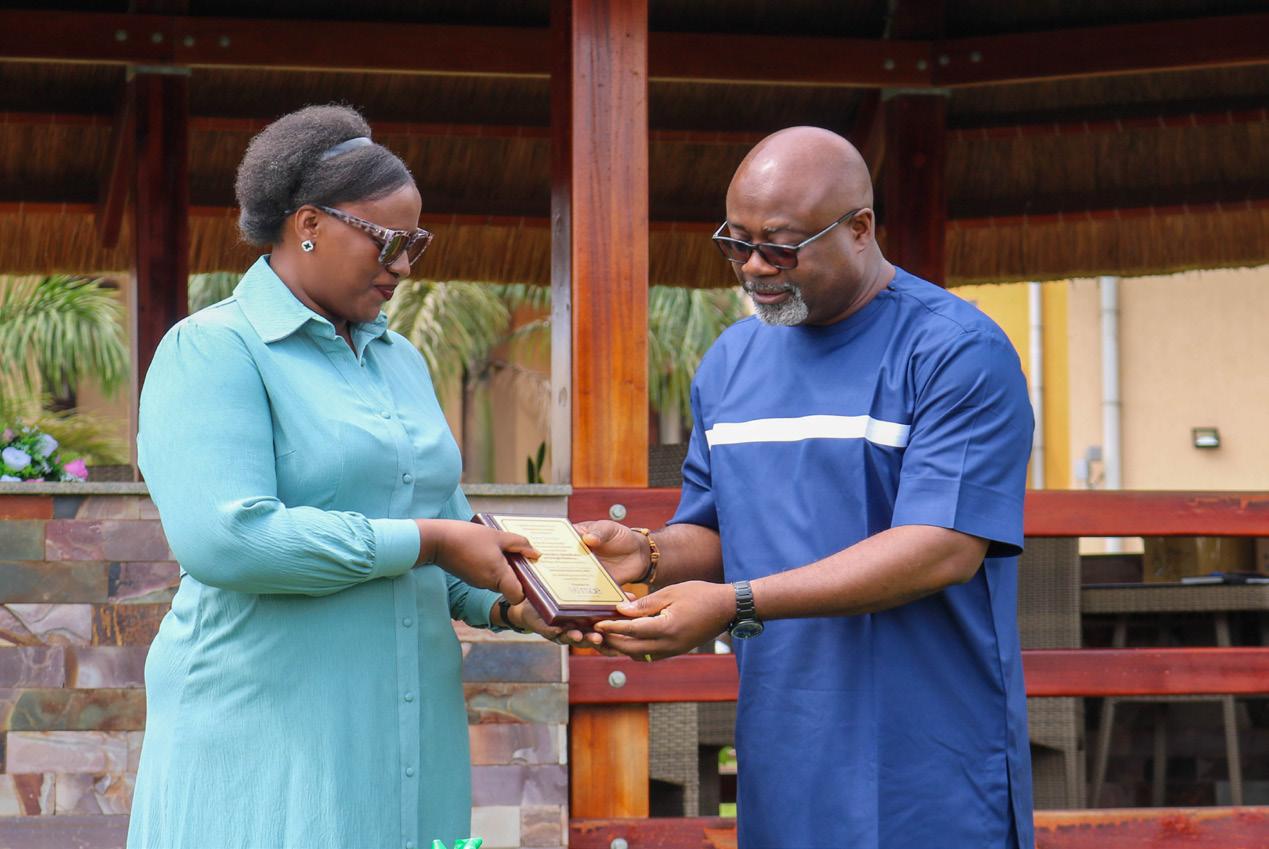
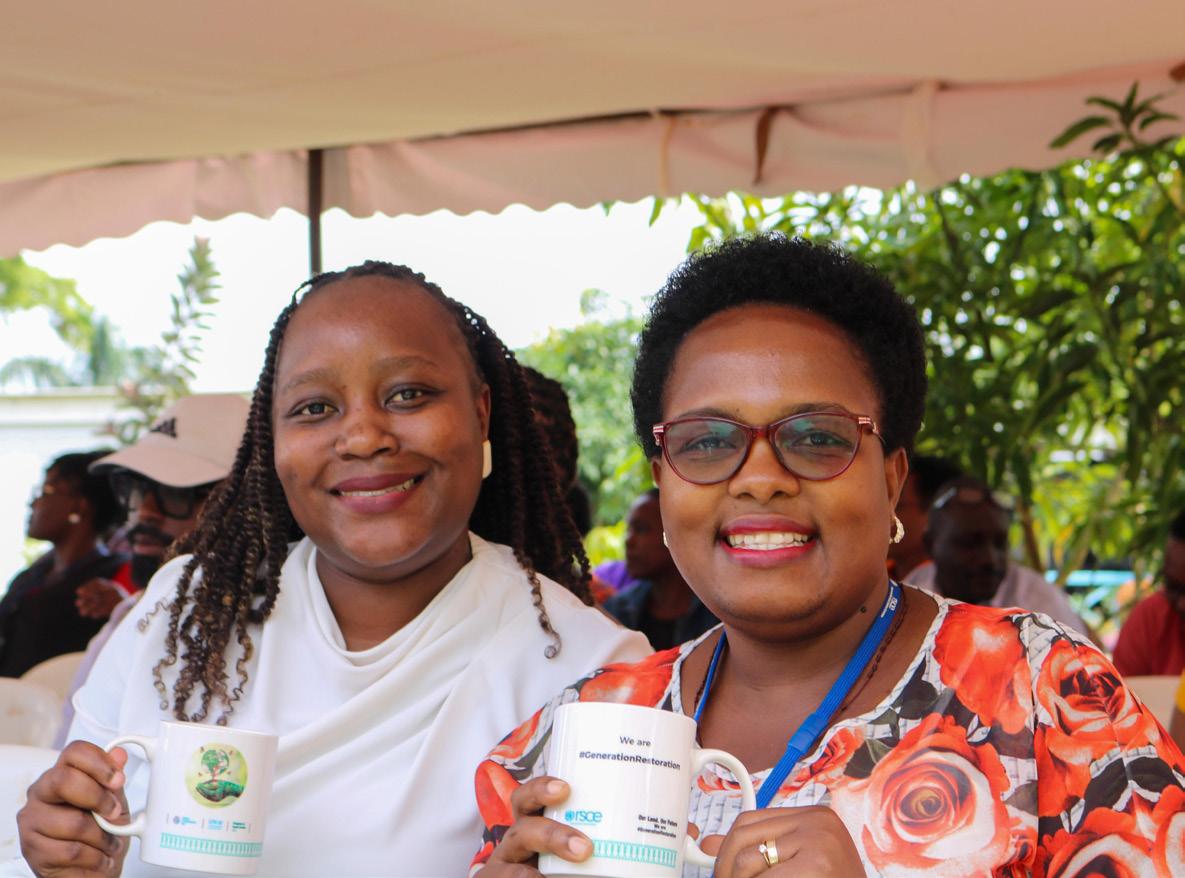
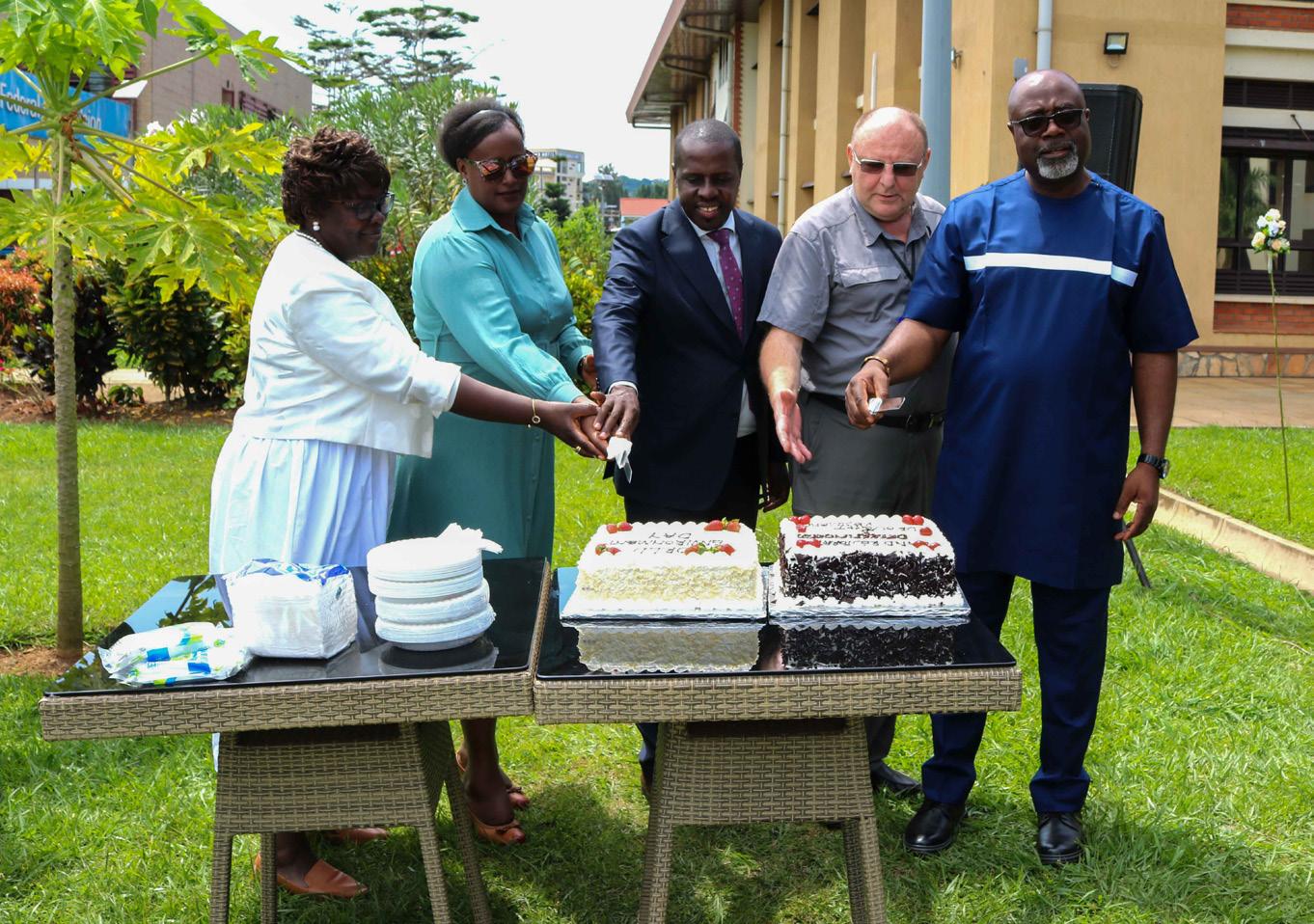
By Mark Kaheru, Public Information Officer, RSCE
The Spur Winged Lapwing: Pearl of Entebbe
Uganda is one of the most endowed countries in the world. It is no wonder it was named ‘The Pearl of Africa’ by Sir Winston Churchill.
In his book, My African Journey, written in 1908, he writes “But for the forests of Uganda, for magnificence, for variety of form and colour, for profusion of brilliant life – plant, bird, insect, reptile, beast – for vast scale and awful fecundity of the natural processes that are beheld at work…Yet it is not possible to descent the Nile continuously from its source at Ripon Falls without realizing that the best lies behind one. Uganda is the pearl.” Powerful words from a great leader, one might say, but was he wrong?
Uganda is a hotspot for biodiversity with 345 mammal species, 142 reptiles, 86 amphibian, 501 species of fish, 1,242 butterflies, 4,500 species of vascular plants and 1,020 species of bird. With 10 National Parks, 12 Wildlife Reserves, 5 Community Wildlife Management Areas and 13 Wildlife Sanctuaries, you would think that all these species are confined in these protected areas. Well, you would be wrong.
We know that here at the RSCE, we have our fair share of these beautiful creatures. Maybe not the thousands but surely in the hundreds. And I am not talking about only the lake flies that greet us almost every morning. We have butterflies and birds, bees and flies, monkeys and cats, snails and lizards, we even have some dogs. One particular animal family stands out though.
The Spur Winged Lapwing.
She has made the area behind the gazebos her home and can be seen nesting there throughout the year. Her companion always nearby, either on the gazebo roof or strolling about keeping her safe.
After a few attempts at bringing up her chicks and being foiled by the cats on the campus, the Director RSCE instructed the Engineering Unit and the Environment Focal Point to come up with a way to protect the family and ensure they raised their young. That led to the construction of a cage that you have most certainly seen erected around the Lapwing whenever she nests.

This small innovation has enabled the birds to raise 3 deceits of lapwings. (Yes, a ‘deceit’ is a group of lapwings named after the way the parent bird lures predators away from their nests by pretending to have a broken wing.)
The Spur Winged Lapwing is the most famous bird on the campus but we have many other species whose nests we are yet to study, since they all traditionally build in trees and on roofs.
For the Spur Winged Lapwing, in case you have not had a chance to see her nest, visit the gazebos but beware, her companion may swoop down to attack you if she does not do so herself.

A few facts about the Spur Winged Lapwing:
1. They feed on insects and invertebrates picked from the ground.
2. They lay four blotchy yellow eggs on a ground scrape.
3. The bird’s name refers to a small claw or spur hidden in each of its wings.
4. They use the wing-claws to attack animals and (rarely) people that get too close to their chicks.
5. Lapwings are nicknamed ‘Peewits’ in imitation of their display calls.
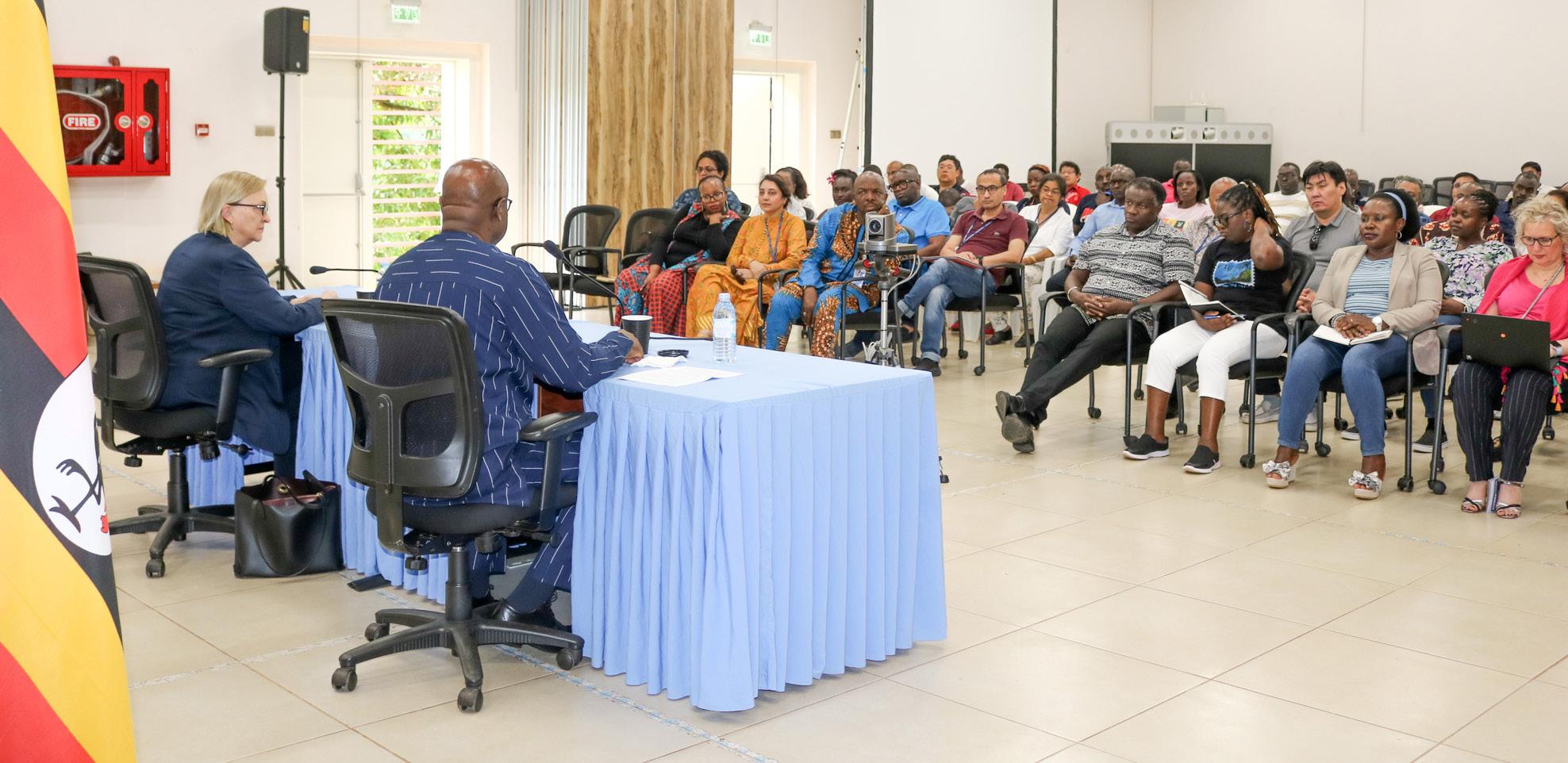
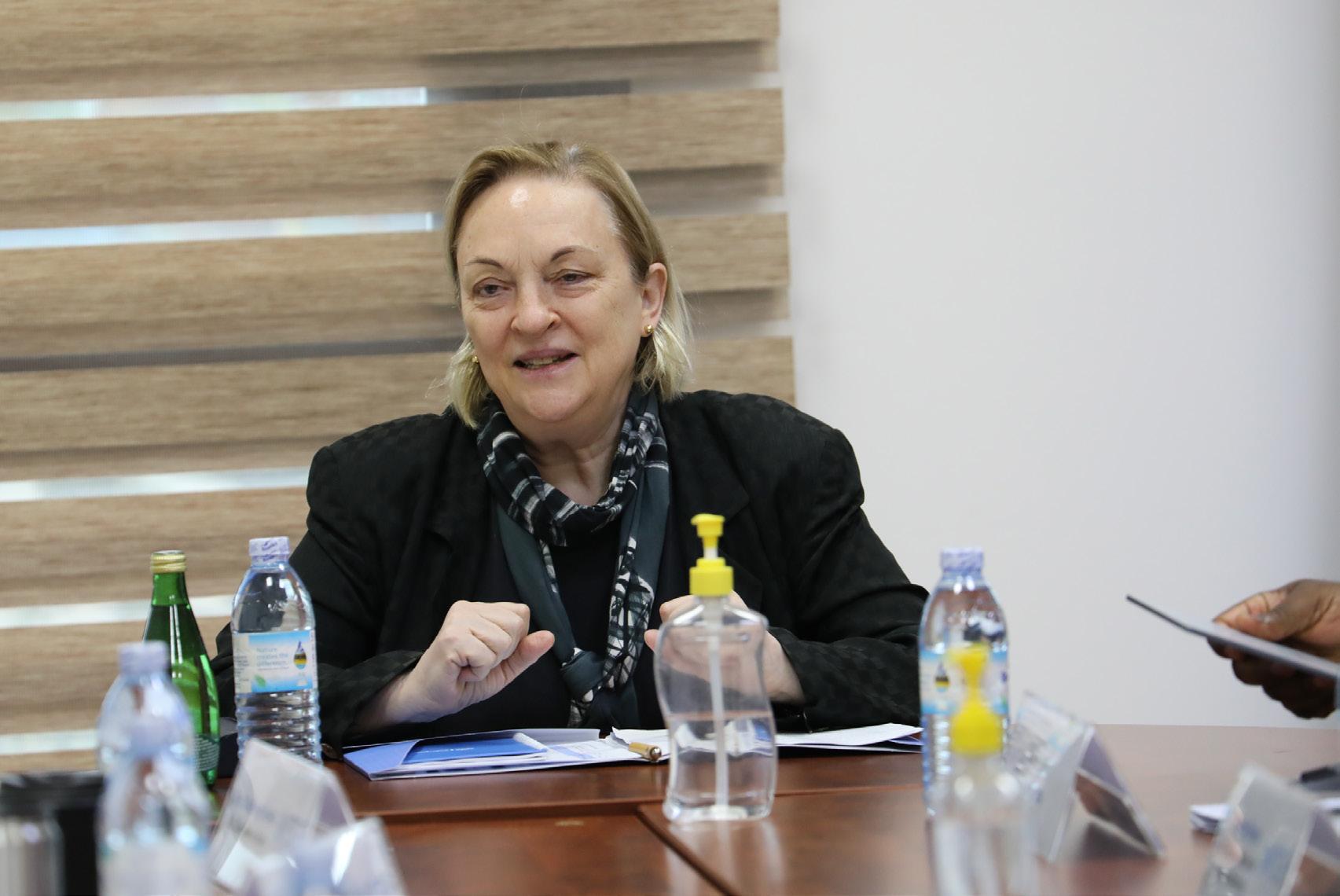
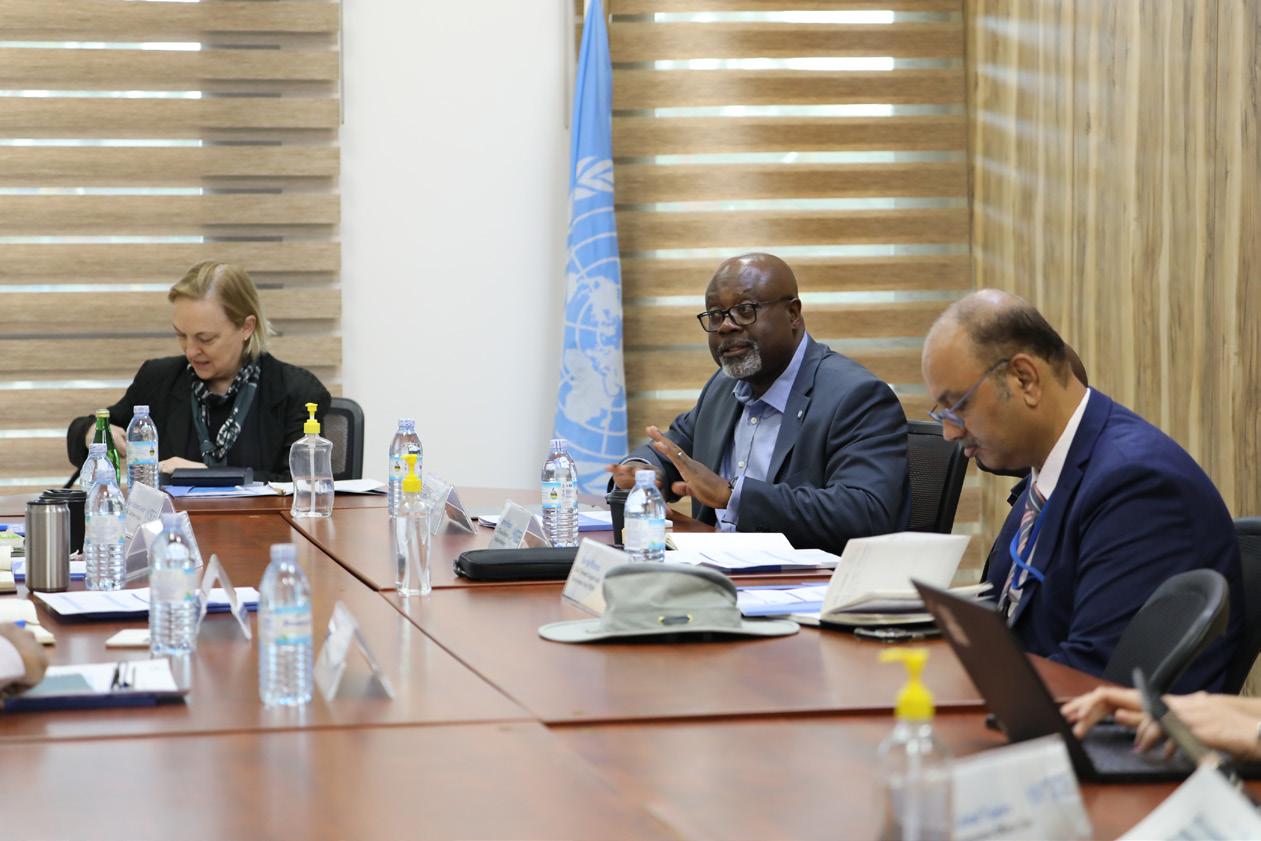
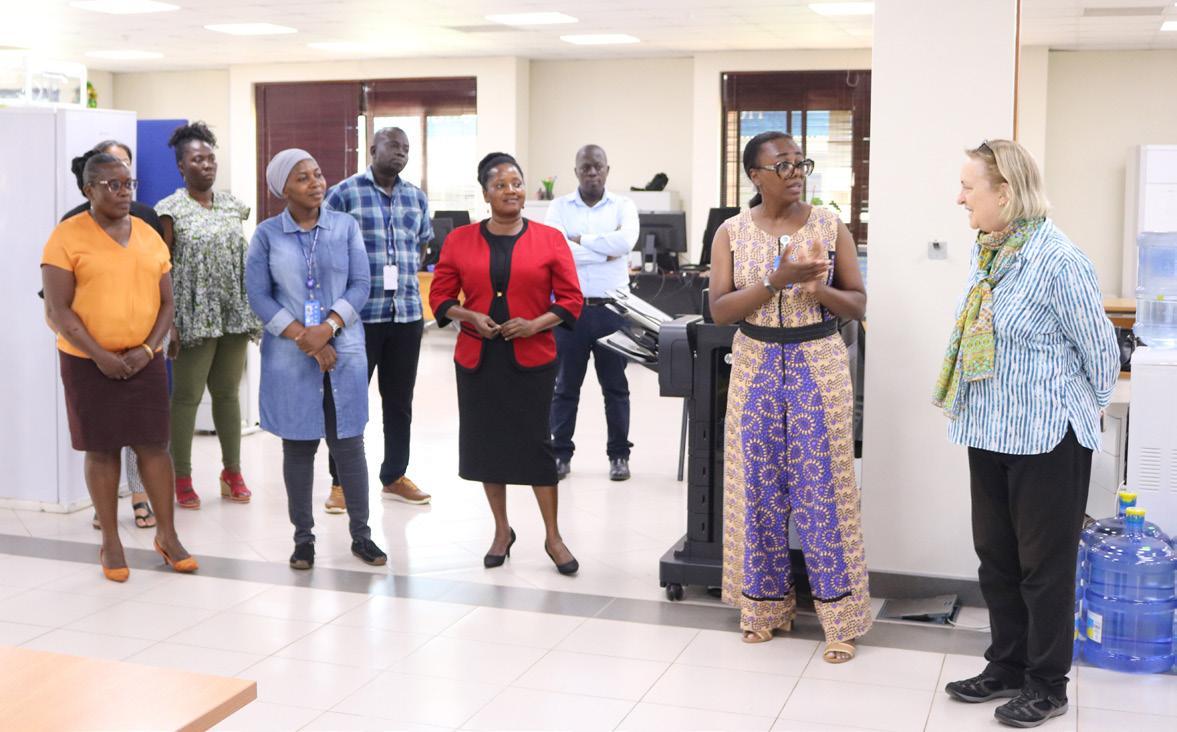
Ms. Lisa Buttenheim, Assistant Secretary-General for Operational Support in the United Nations Department of Operational Support, was in Entebbe for a 3-day visit to the UN Campus.
She met with all Service Delivery Managers and their Service Line Managers to better understand the Centre’s operations and to discuss any challenges.
Her visit concluded with a townhall for all staff at the UN Entebbe Campus where she reassured them that the RSCE is a critical part of DOS and is a Centre of Excellence evidenced by the commendable work they do.
By Elysee Niyigena
“What do you really do?”
A Day in the Life of a Communications Officer at the RSCE
Every morning, as the sun rises over Lake Victoria, I prepare for another dynamic day as a Communications Officer at the Regional Service Centre Entebbe (RSCE). I start the day with a strong cup of coffee and a quick scan through emails.
“What do you really do?”
This is the question I have been asked consistently in the past eight years of my career in strategic communications. Some people think I am just there to snap photos, shoot videos and update social media. Well, maybe that’s all they know about strategic communications.
As I reflect on my time at the RSCE since 2019, I am proud to say that the role of strategic communications extends far beyond that. We are the bridge between the RSCE’s work and the global community. Using different channels, we help to foster a more informed and engaged world, by telling one story at a time. The task is multifaceted, demanding a blend of creativity, strategic thinking, and an acute awareness of global issues.
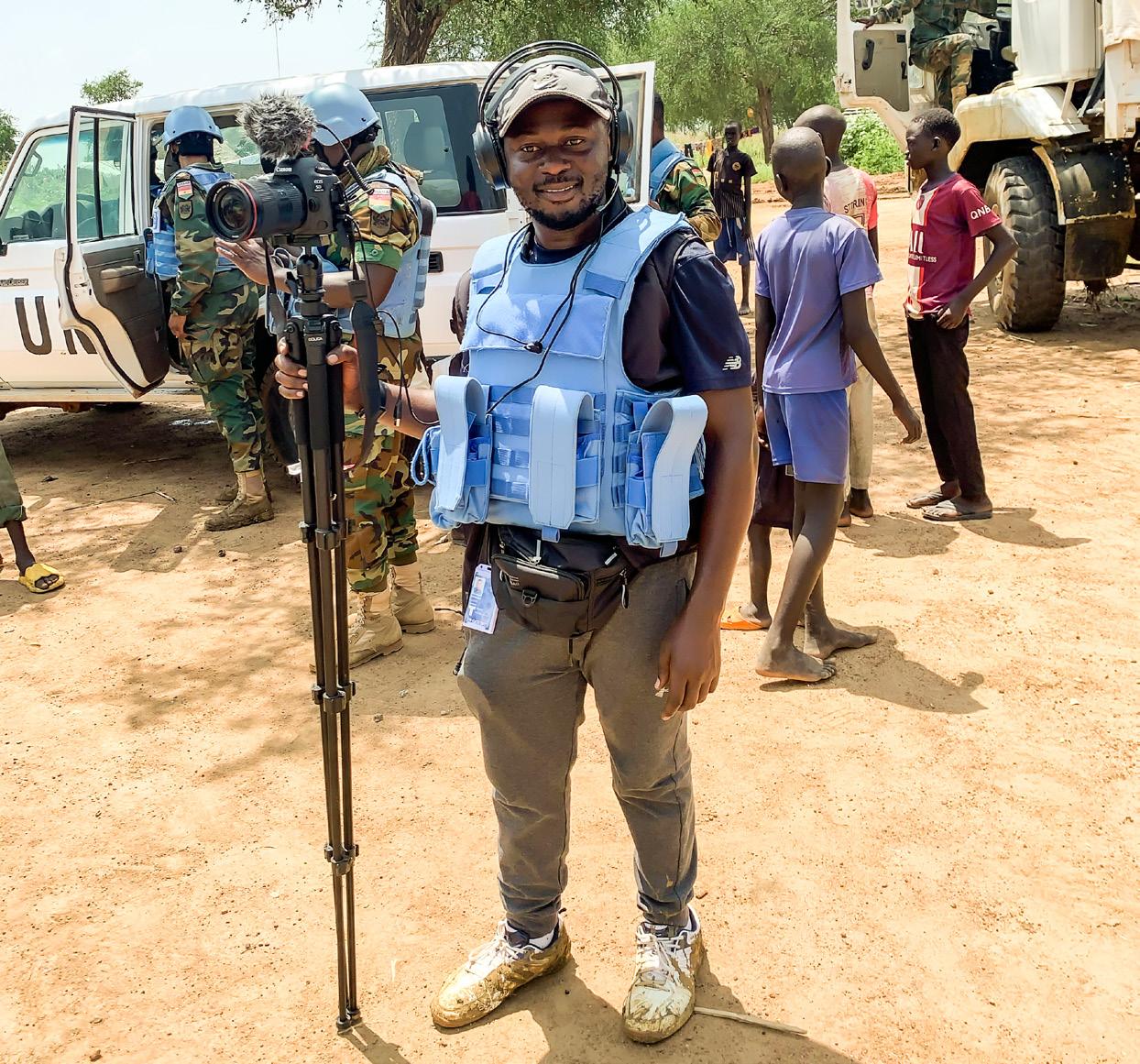
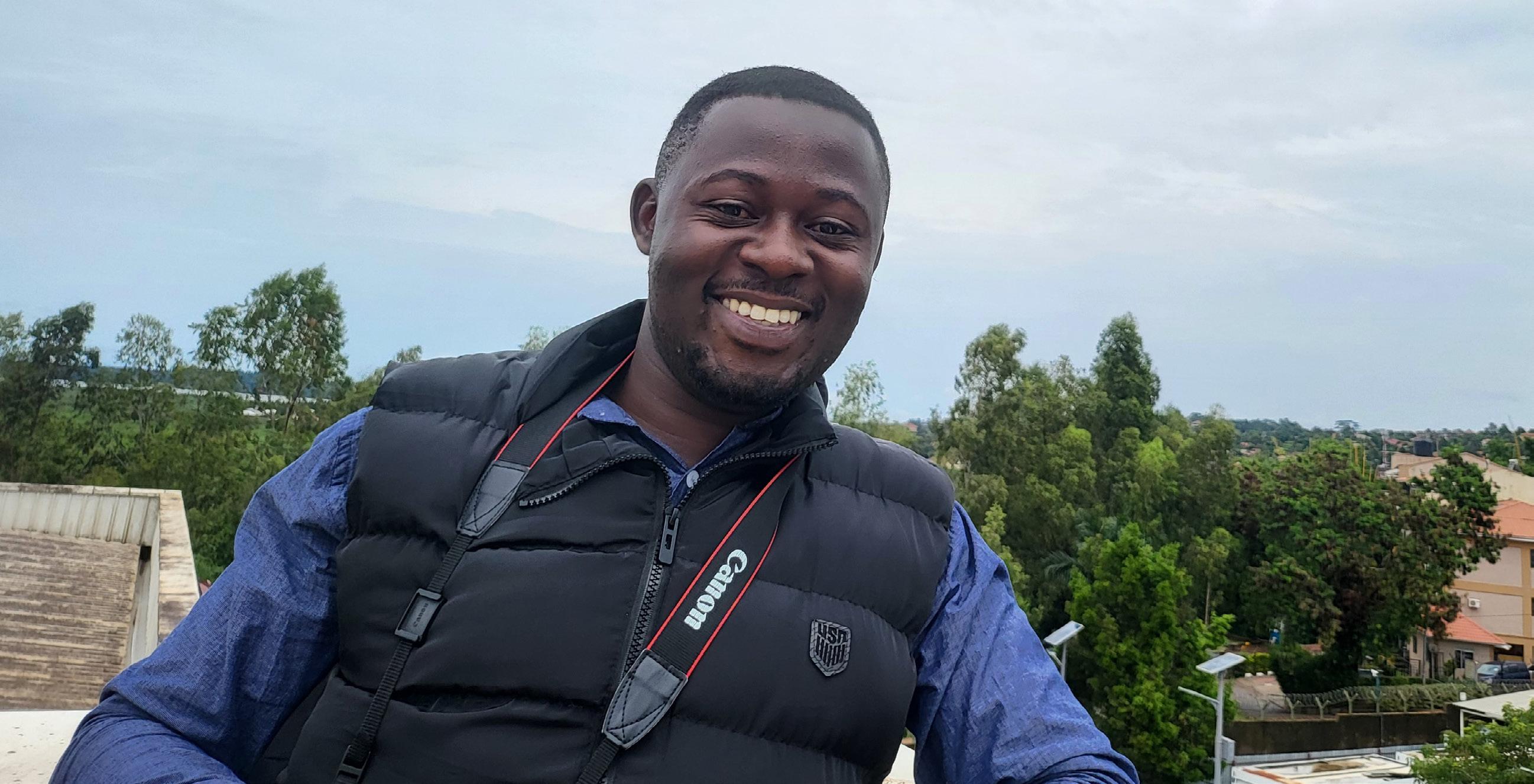
“As I pen this down, I am filled with a profound sense of gratitude that when people see me with a camera, they don’t see a mere photographer, but rather, a storyteller. One who tells a story of what they do through the camera lens.”
In a world full of mis/disinformation, one of my roles as a specialist in communications involves creating and sharing trusted, objective information and inclusive messaging that enables the public to engage in the work of the RSCE. When we move around the campus, we see stories everywhere, and we share them with the world, through the popular RSCE Newsletter, website and iSeek, as well as social media.
Joining the RSCE in 2019 marked the beginning of a rewarding chapter in my career, one that has been defined by professional growth, remarkable experiences, and a deep connection with colleagues at the UN Campus and people in Entebbe community.
When I traveled to the United Nations Interim Security Force for Abyei (UNISFA), my interactions with peacekeepers not only provided me with a new layer of professional experience but also generated a lot of interesting stories to tell. It was an eye opener and offered me a unique perspective on the challenges and rewards of peacekeeping in one of the most volatile regions in Africa. I will continue to share these stories even when I have left the RSCE.
Having said that, I am reminded that I have been here for almost five years. How time flies! As I look back on these years, I am filled with gratitude for the experiences and the people who made my time at the RSCE memorable. The RSCE has been more than a workplace; it has been a community where I have forged lasting friendships and professional relationships.
I look forward to my new endeavors, where I hopefully won’t be answering that same question over and over again. I am excited about the future, but I will always look back fondly on my time at RSCE.
Hasta la vista!
By Samreeddhee Vaidya
Why did an Introvert Join Comms?

Everyone remembers their first day at work, waking up at the break of dawn, ironing clothes and combing your hair in front of the mirror. I was excited about my work experience week, yet when I arrived at the UN campus, my first question was, “When is the lunch break?”, immediately followed by, “What time do work hours end?”. The dread finally filled me of doing my first 9-5.
In the office, I saw my desk, clean and empty, ready for work, I had mixed feelings. Here, I realised my mistake: picking communications, which makes little sense as a self-proclaimed introvert. A very interaction-heavy unit? I don’t know what I was thinking.
However, after meeting the team and falling under their guidance, I came to be grateful I joined this unit as I started to become more comfortable in the environment and quirks of the office, whether it be through the interesting temperatures due to the battle between AC and windows, the meetings, or running around campus to deliver business cards or take photos.
Even in this break from school, I found myself learning – but this time it encompassed more trials and errors, where I had to trust
my skills and try to improve in each trial. I started to pay more attention to intricate details in areas such as photography, where I became more intentional with each shot snapped on the camera. Now, I consciously understand aspects I did not notice before, yet they make all the difference, such as in portraits the backgrounds have to be blurred, the lenses to use for close-ups and wide shots.
Similar to the details which are foundational to an effective article, how subtle word and sentence choices can completely alter the meaning of a text. How your words would change depending on the audience, how to hook them in, and to always have a pen and notepad ready to capture a story.
Despite having only worked for a week, I found the experience to be worthwhile beyond the practical with the interactions, in spite of it being out of my comfort zone, I think that is what made it worthwhile – trying something new and bridging connections with others.
“Here, I realised my mistake: picking communications, which makes little sense as a selfproclaimed introvert.”
It was a challenging and fun experience, you’re thrown into a maze and have to figure your way out, but you learn, adapt, and grow. Especially since it introduced me to new skills such as photography which I’ve now gained a deeper appreciation for, while expanding on my interests in writing.
Before this week, I was not aware of what the Regional Service Centre Entebbe (RSCE) did, what was the purpose of a service centre? After this week, I’ve witnessed the importance of its role in maintaining and ensuring that all peacekeeping operations in Africa are successful and the role which communications plays in this. After all, nothing can effectively take place without knowing one another.
This week has taught me a lot about delving into newfound interests and stepping out of your comfort zone, dampening my worries about work as I’ve come to appreciate the small things of office life. All in all, better equip me for the future.

By Mark Kaheru, Public Information Officer, RSCE
Cry Our Beloved Trees
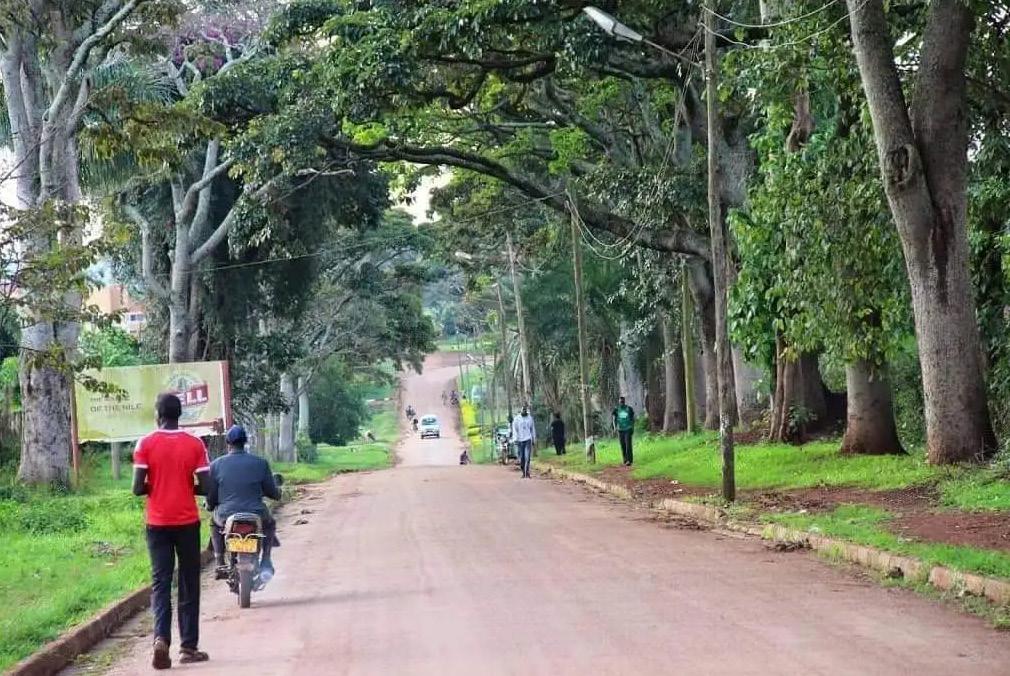
In the early 1920s, Colonial Chief Semei Kakungulu planted now endangered Mvule trees in Jinja. Bridge Street and Nile Avenue are some of the roads that were lined with these magnificent trees.
The trees are an essential feature in Jinja’s tourism and social fabric, as they not only provide beauty and shade for people taking their evening or morning strolls but are also essential for the sustenance of the environment.
In 2019, the management of the National Farmers Agricultural Showground wrote to the Jinja Municipal Council and requested for permission to fell two of the trees to give way for construction of a boundary wall. They later expanded that request to include four other trees.
It is important to note two things here. The Mvule Tree takes over 50 years to grow to maturity and the National Farmers Agricultural Showground occupies 16 acres of land.
Let us see if we can break this down a little further.
From primary school, we have been taught that trees conserve soil and water, enhance soil fertility and improve soil structure. Trees can also help retain moisture and reduce wind speeds and so contribute to higher crop yields.
This should be something of great importance to the farmers affiliated with the National Farmers Agricultural Showground. Oh, did I mention that permission was granted to the association on condition they paid to the Council a sum of two hundred and fifty thousand Uganda shillings (Ugx 250,000/-)? Additionally, they were to plant five trees in replacement and maintain them to maturity…50 years.
Now isn’t that noble on part of Jinja Municipal Council?
For a national association of farmers to even think it okay to fell even one fully grown tree so that they do not lose 2 metres of their vast 16 acre land is not only ironic but rather laughable. For the Council to even condone the thought might be even worse. I believe it would have been best for the showground to build their wall 2 metres into their land so as to preserve the environment and beauty of Jinja.
And then in 2022, the same Council gave permission to Zhongmei Engineering Group to fell eight Mvule trees along Nile Avenue to widen the drainage systems. We see this a lot, the trees suffer so we can build roads.
In 2018, in a place called Katama Cell in Masindi District, a very famous tree that was named Rutumba was felled to pave way for the Bulima – Masindi – Kigumba road. Why was this tree famous?
Begs the question, how large is a tree that a road or a wall cannot be built around it? How hard is it to conserve our trees?
Uganda loses an average 510 square kilometres of trees annually since 1900. We have lost 51.4% of our forest cover since 1900. And yet it is not like we do not have a lot of arable land that we can occupy.
I know some say if we each plant a tree a year, we can get it all back…probably true but with trees that take 50 years to grow…will I ever be able to see a new Mvule tree grow to maturity in my time? Or should we replant our forests with mango and avocado trees and hope they do not come for those as well.

On 25 April 1872, Sir Samuel Baker, the Governor-General of the Equatorial Province (Colonial Egypt) pitched camp under this tree as he prepared to take on 19 year old Omukama Chwa II KABALEGA in what came to be known as the Battle of Baligota Isansa at Kyamuleju-Kijura North Cell, Central Division, Masindi Municipality.
Baker sought to annex Bunyoro-Kitara and the entire southern Nile basin to the equatorial province as part Colonial Egypt’s imperial ambitions to have full control over the River Nile. He was however humiliatingly defeated by Omukama Kabalega. Wouldn’t you say this tree was part of history, part of the Bunyoro cultural heritage?

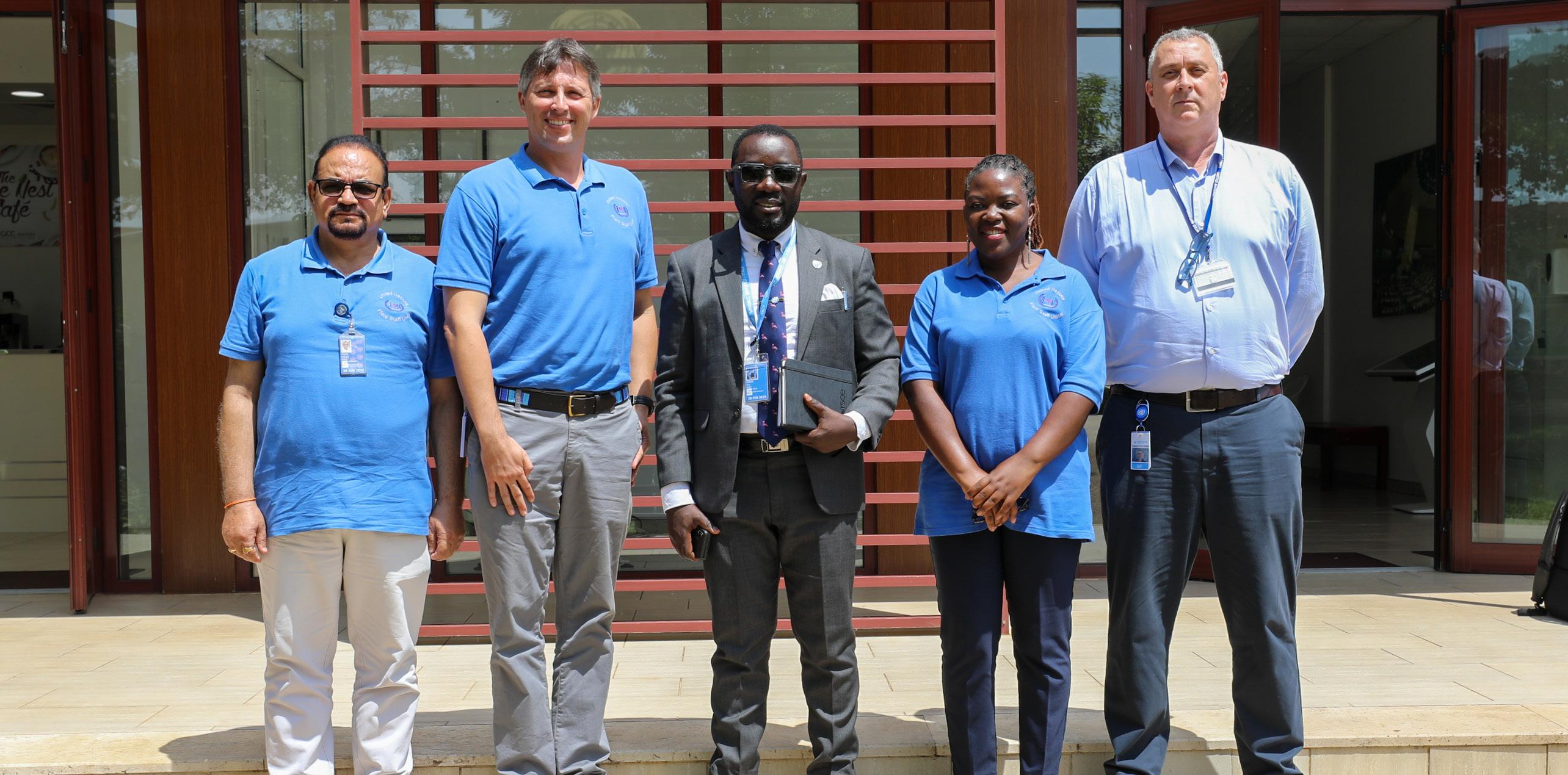
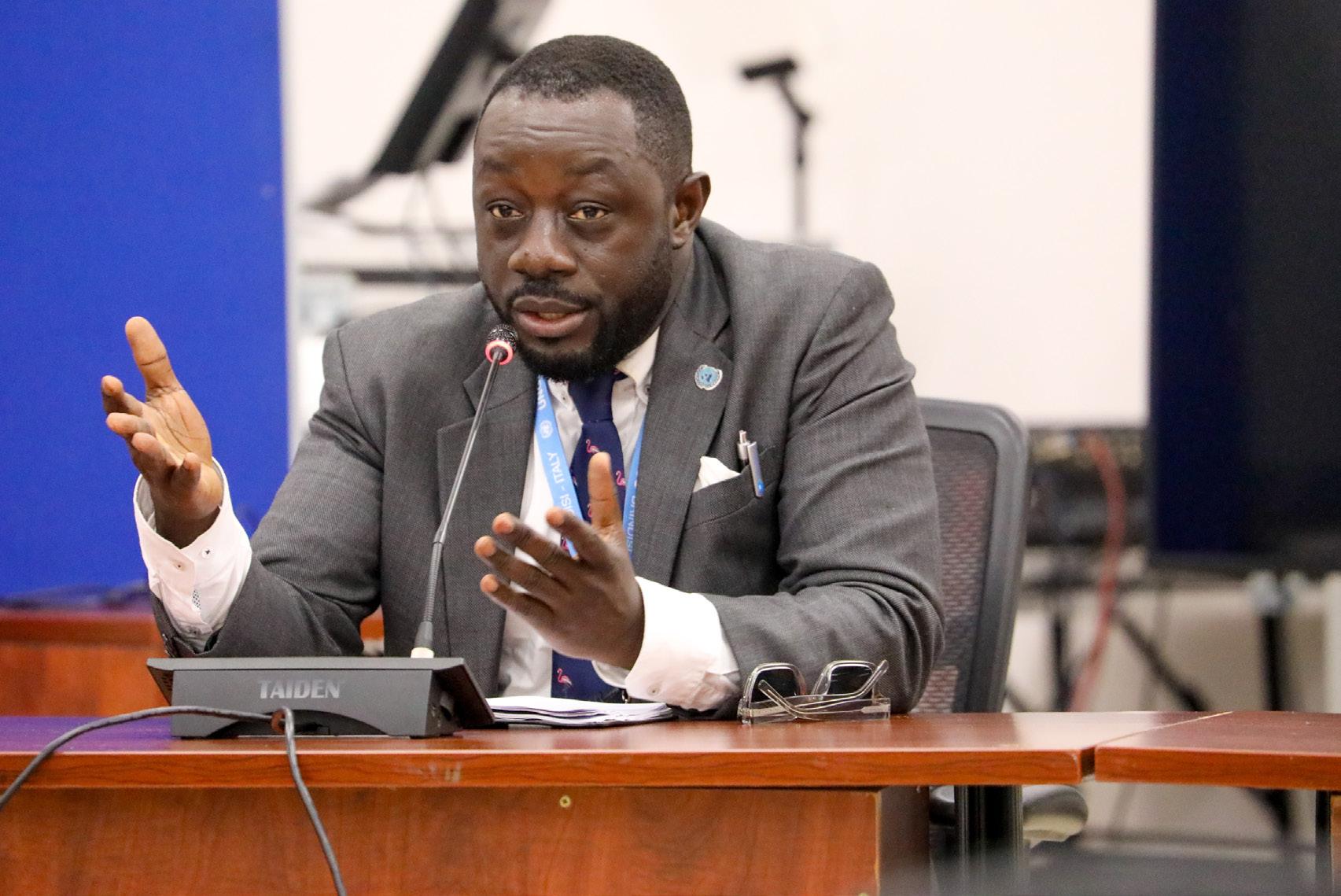
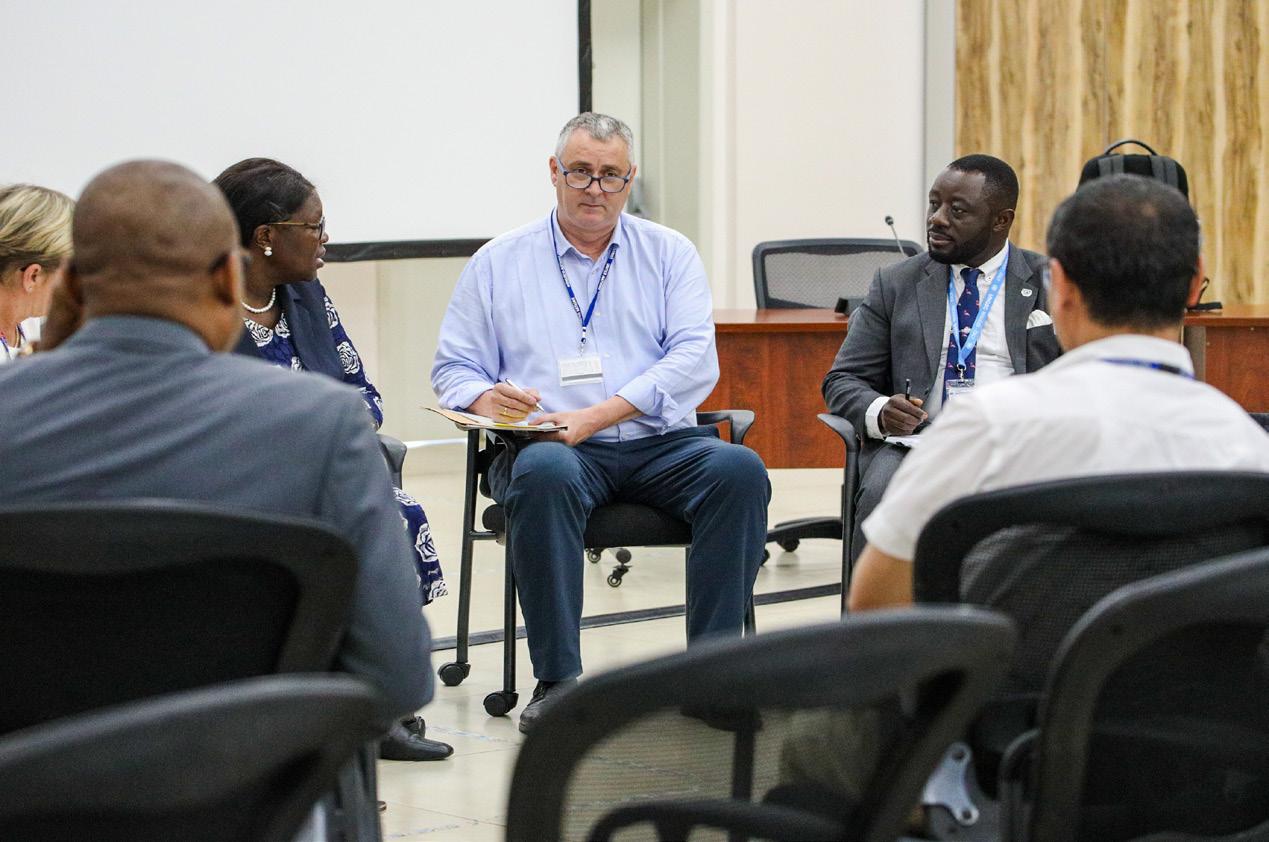
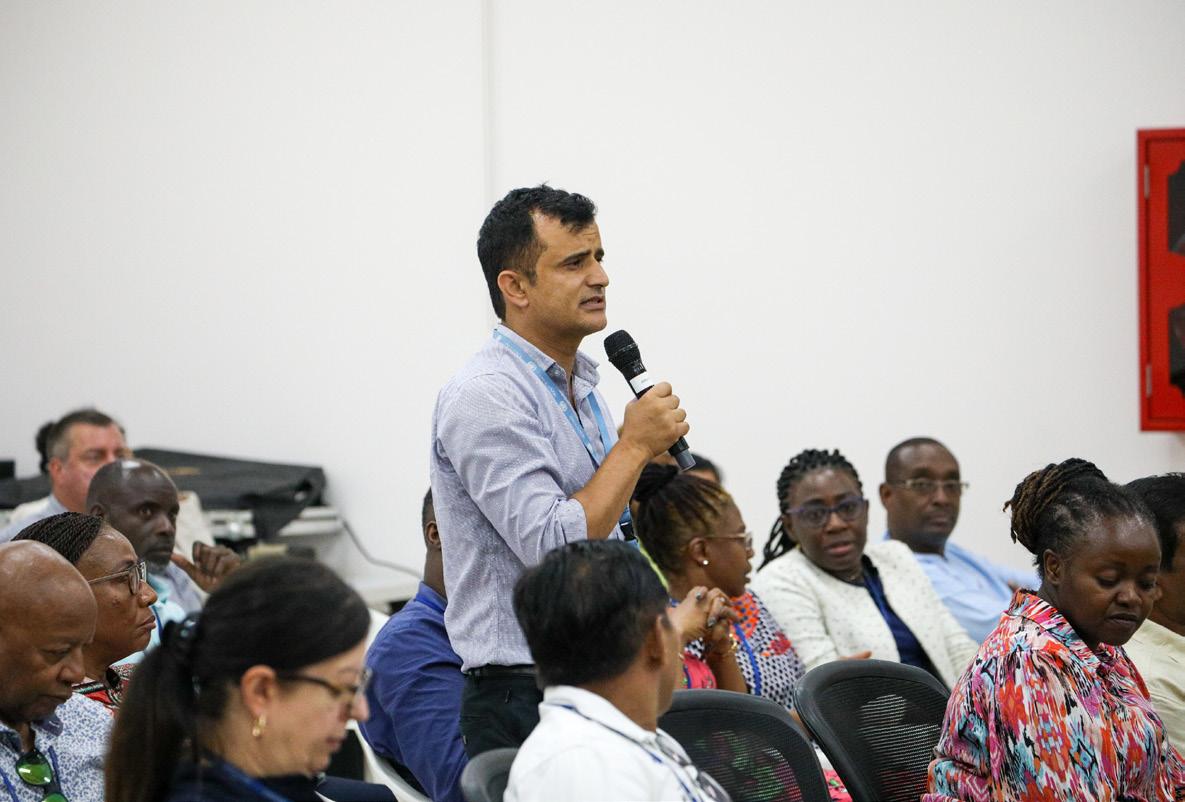
The United Nations Field Staff Union (UNFSU) Executives - President Mr. Milan Dawoh and Vice President Mr. Paul Smith visited the United Nations Regional Service Centre Entebbe on 3 June, as part of their tour of the African missions.
Highlights included a meeting with the Head of Premises and RSCE Director Mr. Paulin Djomo, and UN senior management. The visit to RSCE ended with a well-attended townhall meeting with UN Secretariat staff.
UNFSU defends the rights and supports the welfare and well-being of internationally recruited UN staff, who are assigned to and work in UN Field Entities.
#StrongerTogether
Staff Welfare: Nurturing a Culture of Wellbeing
By Jullian Kahara Atukunda, Communications Assistant, RSCE
In the bustling global arena of the United Nations, where diverse cultures and backgrounds converge, the welfare of its staff is a priority. Staff are the backbone of UN operations, from humanitarian aid to peacekeeping missions, often operating in challenging environments. Prioritizing their physical, mental, and emotional wellbeing is not just a policy but a moral imperative.
At the RSCE, the Staff Welfare Committee (SWC) plays a pivotal role in managing various aspects of staff welfare. The committee ensures that all personnel and their dependents are well-informed about available activities and resources.
Recognizing that physical fitness is integral to overall wellbeing, SWC has dedicated efforts towards providing access to a wellequipped gym facility within the campus. Open throughout the week, the gym offers state-of-the-art equipment catering to diverse exercise preferences alongside an experienced trainer, Mr. Brian Mugagga, who provides personalized guidance. Furthermore, the Committee aims to expand gym operating hours ensuring that staff members can have access before or beyond working hours and over the weekends. This commitment reflects an unwavering dedication towards promoting holistic wellness among staff members.
In addition to this, SWC organizes group activities such as walking on Tuesday and Thursday evenings, as well as hosting a Farmer’s Market on Thursdays from 11 am to 4 pm where staff can procure fresh and organic locally grown produce and engage with local farmers.
The Friday Happy Hour provides an avenue for employees to engage in fun activities ranging from singing karaoke to playing indoor games while enjoying fellowship with one another and getting to know each other outside the work routine.
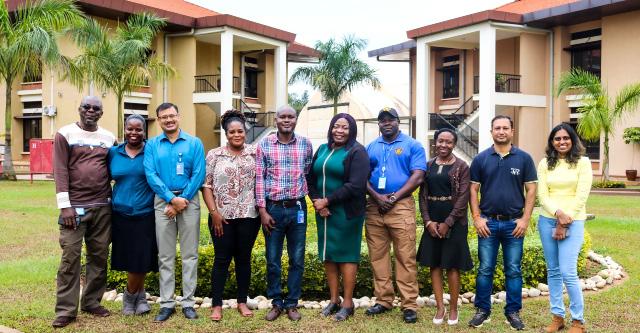
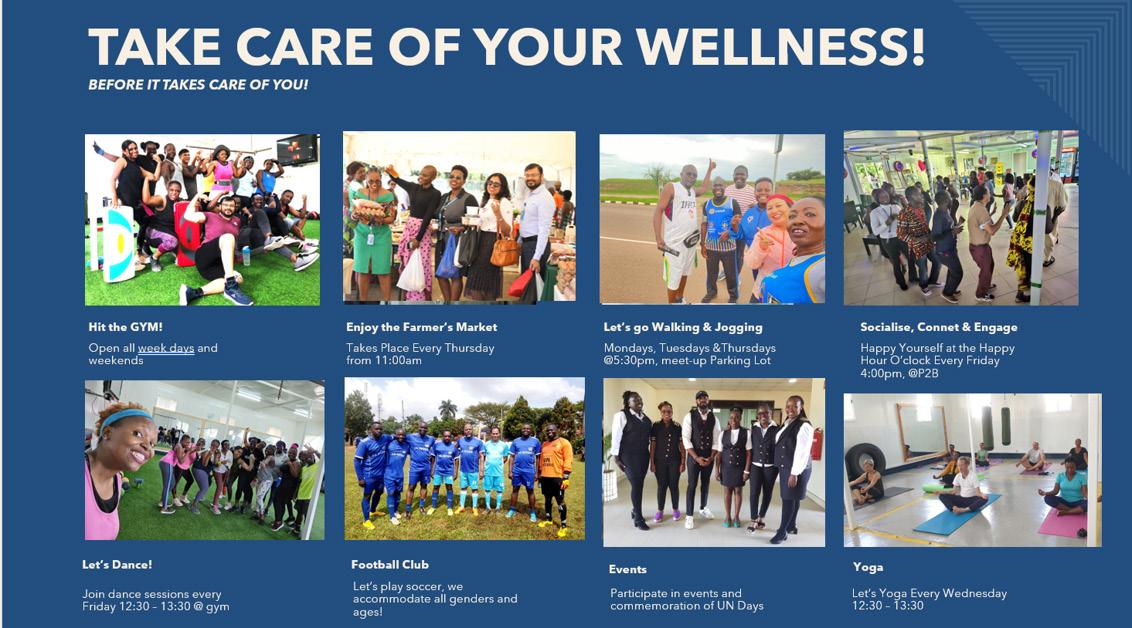
The Power of Engagement
From volunteering initiatives to wellness programs, engaging staff not only enriches those served but also fortifies organizational culture by fostering camaraderie and shared values among employees.
Participating in local charity drives or organizing fundraising events allows personnel to extend their impact beyond professional roles into tangible contributions within their communities and nurtures empathy while forging strong bonds rooted in collective purpose across hierarchical boundaries.
Additionally, involvement yields individual health benefits through acts of kindness, triggering endorphin release, promoting happiness and contributing positively toward mental wellbeing and further cultivating resilience against workplace stressors.
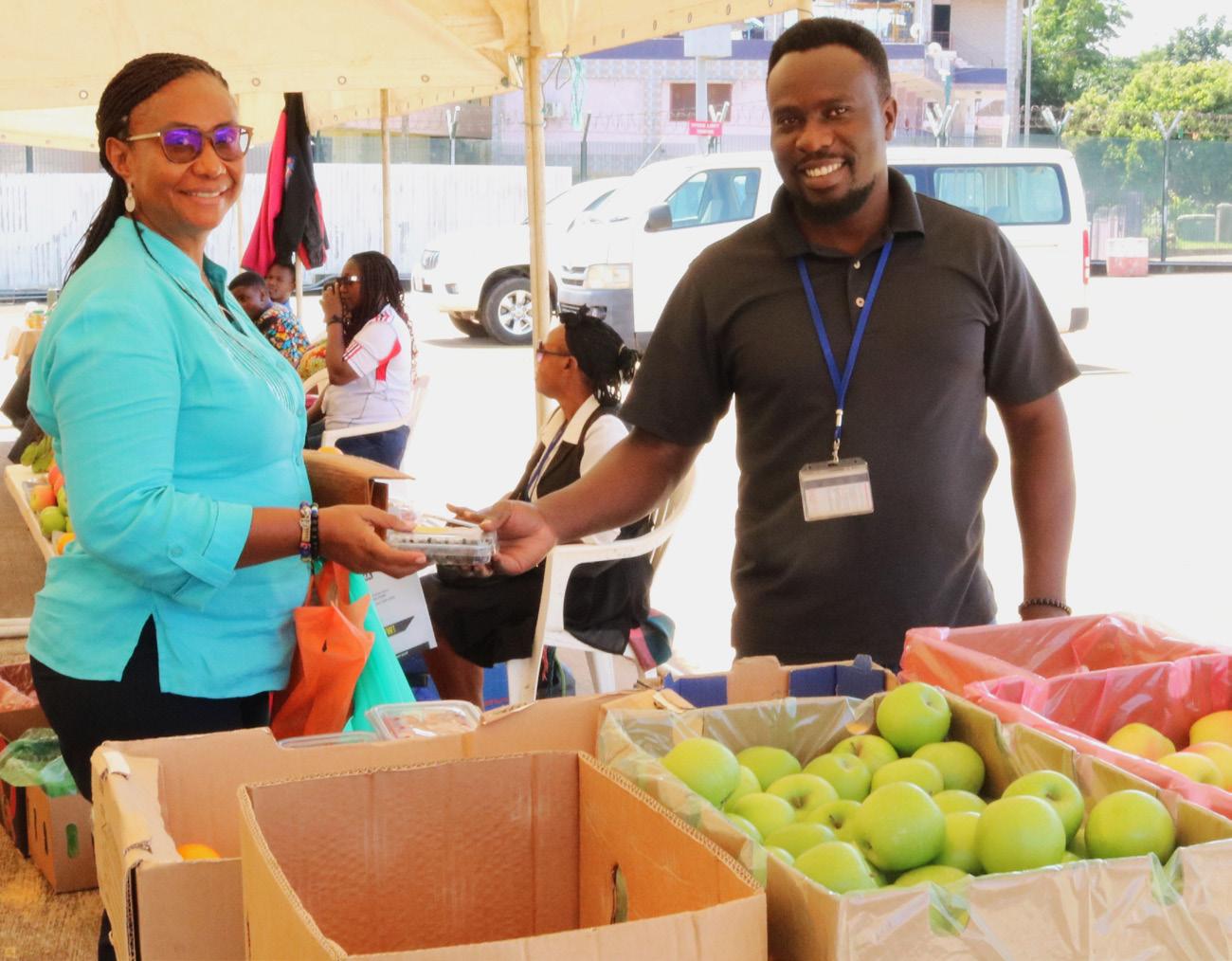
Workplace Wellness: Tackling Obesity Together for a Healthier Tomorrow
“Individuals grappling with obesity and overweight are more susceptible to infections and experience compromised immunity, exacerbating their vulnerability to various illnesses and health complications.”
Obesity and overweight are pressing global health concerns impacting millions, including staff of the United Nations. These conditions occur when one has an excessive amount of body fat relative to their height, as measured by Body Mass Index (BMI).
Overweight is classified as a BMI between 25 and 29.9, while obesity is a BMI of 30 or higher, indicating a significant accumulation of body fat with adverse health effects.
According to the World Health Organization:
• In 2022, 1 in 8 people worldwide lived with obesity.
• Adult obesity has more than doubled globally since 1990, while adolescent obesity has quadrupled.
• 43% of adults aged 18 years and over were overweight, and 16% were living with obesity.
• 37 million children under 5 were overweight, and over 390 million children and adolescents aged 5–19 years were overweight, including 160 million living with obesity.
Overweight and obesity are major risk factors for some of the leading causes of poor health and premature mortality, including cardiovascular disease, several prevalent cancers, type 2 diabetes, and osteoarthritis. They also bear profound psychological ramifications, fostering conditions like depression, anxiety, low self-esteem, and body image concerns. Beyond these health challenges, they also exert adverse effects on reproductive health.

In women, they can disrupt hormonal balance and menstrual cycles, leading to fertility issues and complications during pregnancy. In men, obesity is associated with lower testosterone levels and an elevated risk of erectile dysfunction.
In our workplace, the impact of overweight and obesity is profound, with noticeable effects such as decreased productivity stemming from fatigue, reduced mobility, and diminished concentration among staff. This can result in increased absenteeism due to illness or medical appointments.
The prevalence of overweight and obesity contributes to higher healthcare costs related to treatments, medications, and healthcare services. Additionally, workplace injuries may become more prevalent due to the physical limitations associated with excess weight, posing risks to both employees and organizational efficiency.
To prevent overweight and obesity, staff can implement the following strategies:
1. Engage in physical activity
2. Adopt healthy eating habits
3. Maintain work-life balance
4. Participate in wellness programs
5. Foster a positive work environment
6. Undergo regular health screenings
7. Seek support services
You can also use the figure below to monitor your weight and strive to maintain a healthy BMI within the normal range for your height and body type:

In conclusion, obesity and overweight significantly increase the risk of developing chronic diseases and have a profound impact on both physical and mental health, reducing quality of life and life expectancy if left untreated. Addressing obesity through lifestyle modifications, including healthy eating, regular physical activity, and behavior changes, is essential for preventing and managing obesity-related health problems.
Welcome

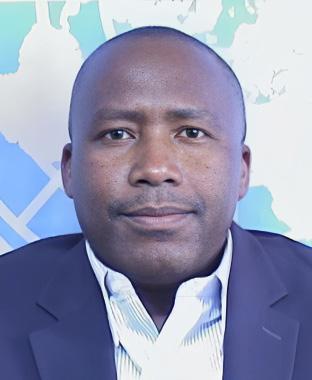

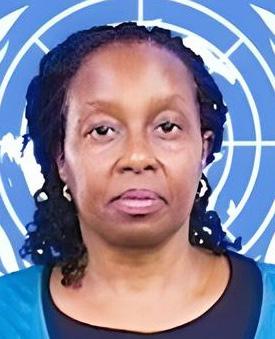
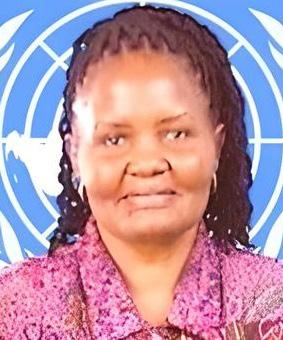
Farewell
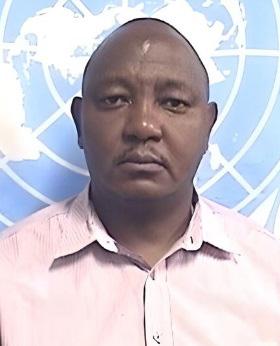
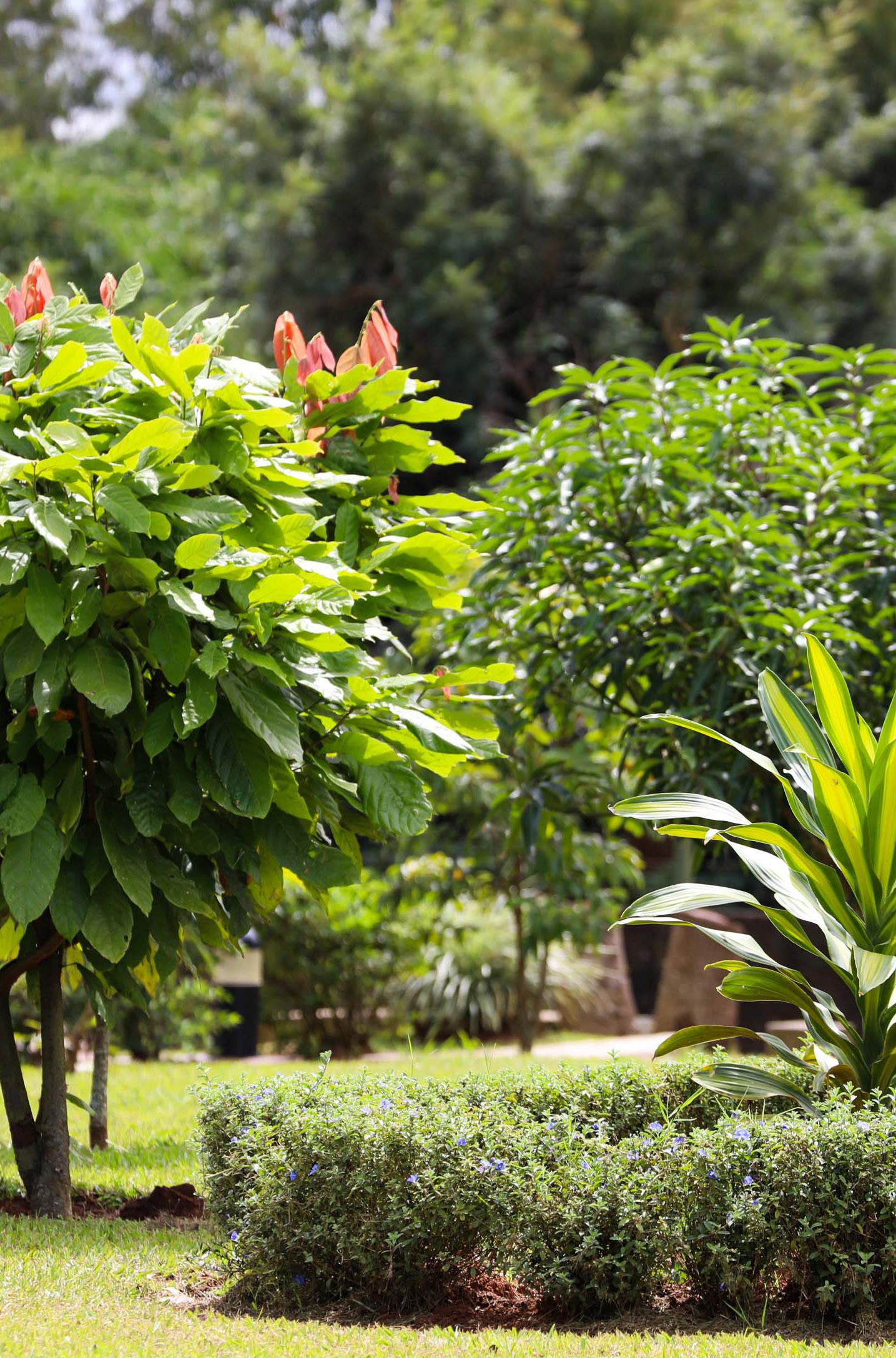

Welcome to our RSCE Newsletter Quiz! It is a short and painless test of your general knowledge. We will be testing you on things you should have seen or heard of here at the UN Entebbe Campus.
You can only participate once, and you have to answer all 10 questions within 5 minutes. Prizes will be awarded to 5 of the top performers who shall be selected from a random draw.
Quiz expires on 29 July 2024, so do not delay, enter the quiz to win! Click here or scan the QR code above.

















